Flashstor Gen 2 NAS Review – TRUE FLASH PERFECTION on Your Desktop?
In 2024, the network-attached storage (NAS) market has entered a new era, with SSD-based systems becoming increasingly mainstream. The Asustor Flashstor Gen 2 exemplifies this shift, offering high-performance capabilities in a compact and versatile package. Designed for content creators, small businesses, and data-heavy enthusiasts, this NAS is available in six-bay and twelve-bay configurations, with the 12-bay model standing out as a powerhouse solution. This second-generation device builds on its predecessor’s success, leveraging advancements in hardware and connectivity to cater to modern demands. Equipped with an AMD Ryzen Embedded V3C14 quad-core processor, 16GB of DDR5 ECC memory, and 12 M.2 NVMe slots, the Flashstor Gen 2 is primed for high-speed storage and processing. Its focus on hardware capabilities, rather than purely software features, makes it a unique offering in the NAS space.
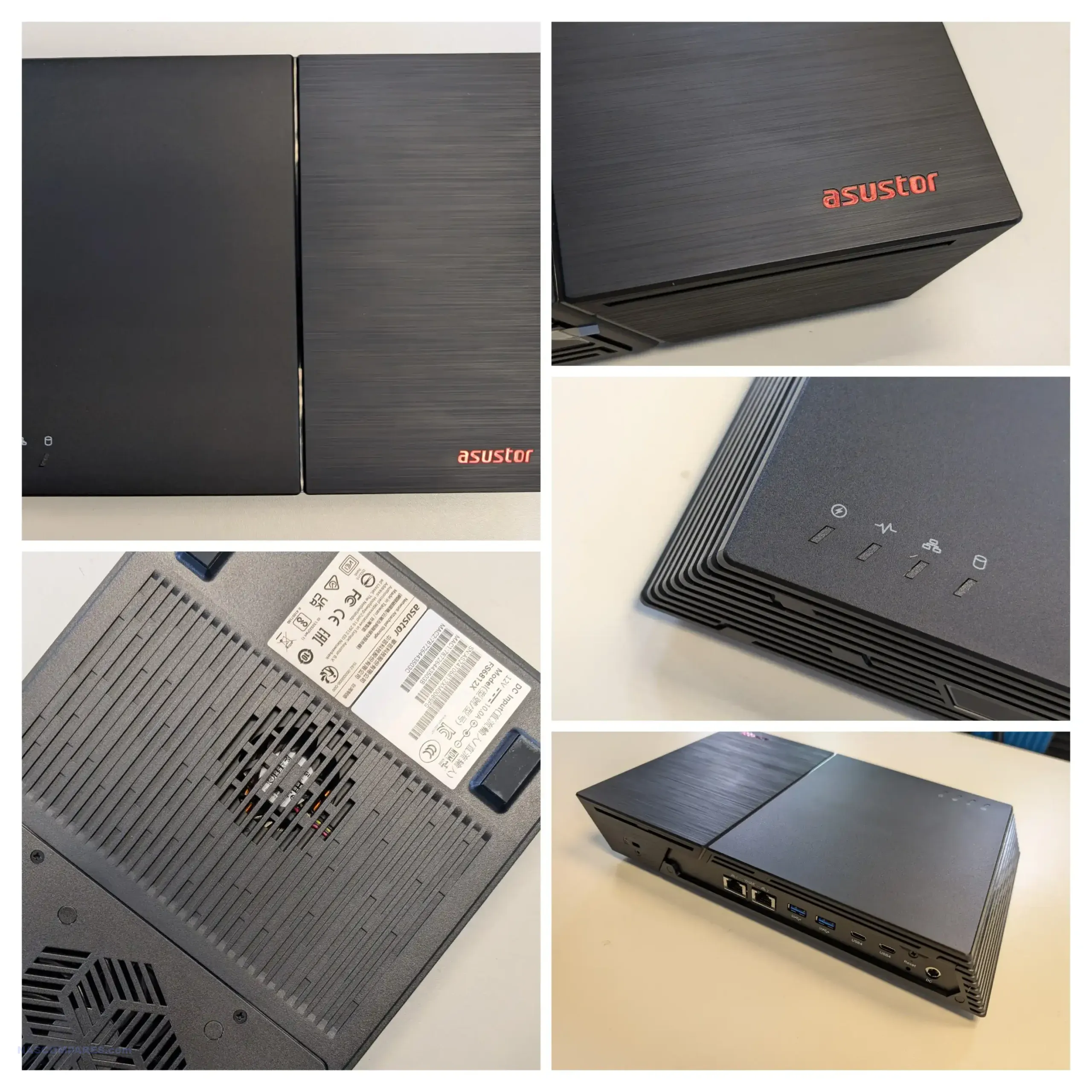
Asustor’s choice of components, including dual 10-Gigabit Ethernet ports, USB 4.0 connectivity, and a carefully optimized thermal design, signals its intention to appeal to professionals requiring robust performance. These features are particularly relevant for workflows like video editing, 3D rendering, and collaborative data sharing. With its balance of compactness and capability, the Flashstor Gen 2 has generated significant interest.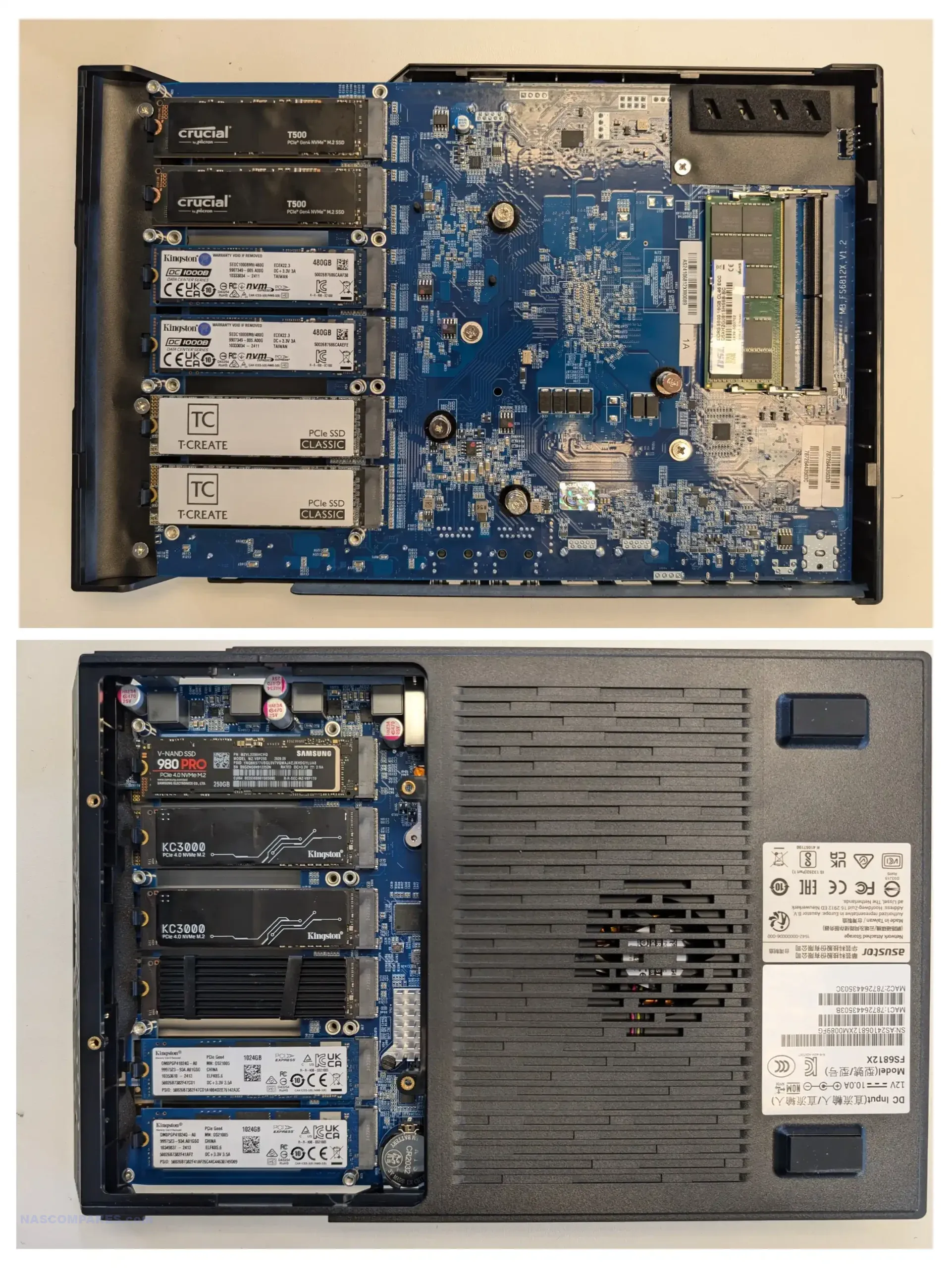
In this review, we’ll explore the Flashstor Gen 2’s design, performance, storage configuration, connectivity, power efficiency, and more. While the device is not without its quirks, it delivers a compelling package for those who demand high-speed, reliable storage.
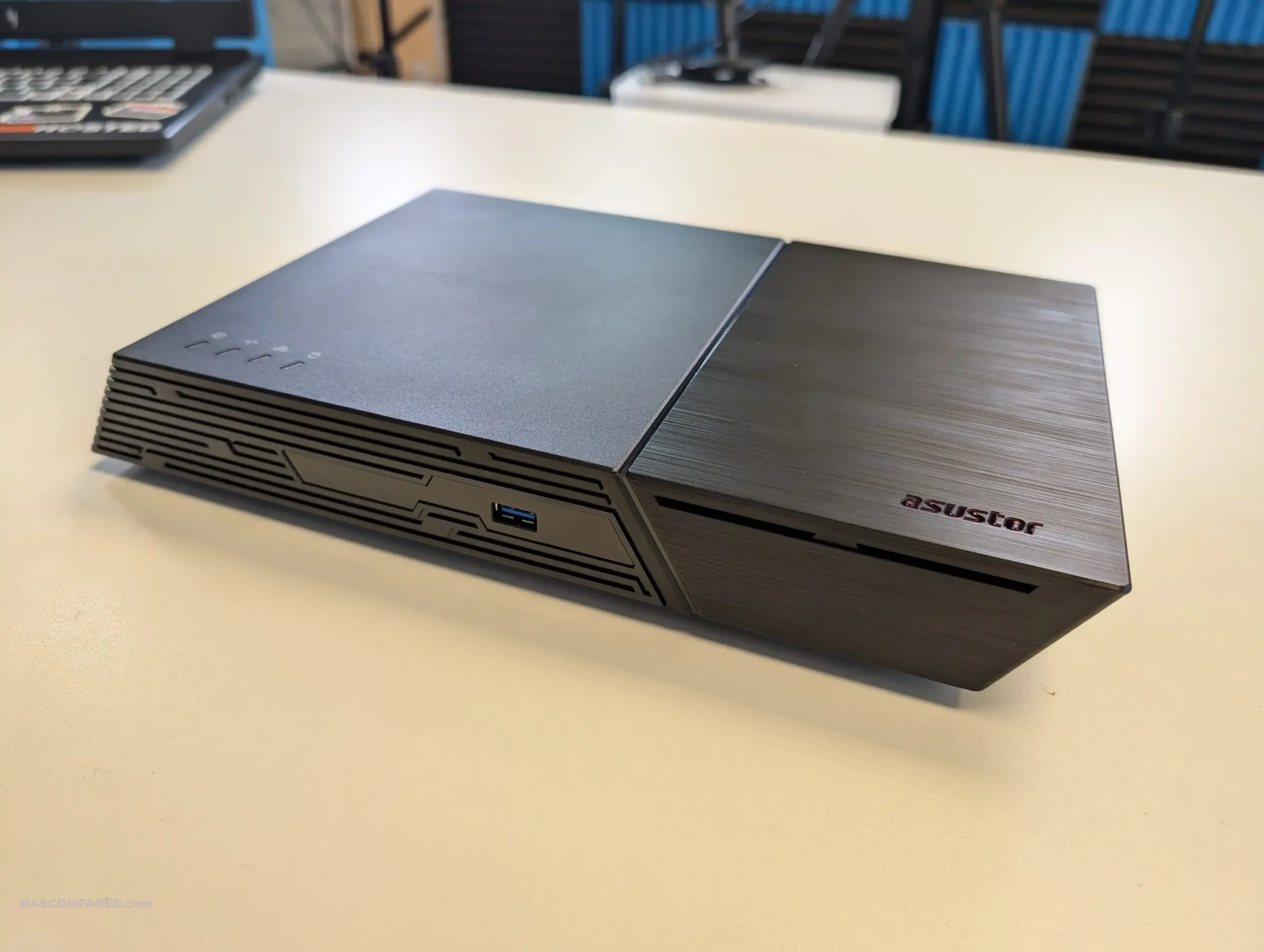
Flashstor Gen 2 Review – Quick Conclusion
The Asustor Flashstor Gen 2 12-Bay NAS is a robust and versatile solution for users with demanding storage needs. Its combination of high-performance hardware, extensive connectivity options, and compact design makes it a standout choice for content creators, small businesses, and enthusiasts. With dual 10GbE ports, USB 4.0 connectivity, and support for up to 12 M.2 NVMe drives, it offers exceptional speed and scalability. While the device has a few quirks, such as its mixed PCIe slot speeds and lack of M.2 heat sinks, these are manageable with proper planning and aftermarket solutions. The Flashstor Gen 2 excels in raw performance, handling intensive workflows with ease and maintaining low noise levels even under load. Its power efficiency and robust thermal management further enhance its appeal for 24/7 operation. For users prioritizing hardware capabilities and performance, the Flashstor Gen 2 delivers on its promises. While its complexity may deter less experienced users, those with the technical expertise to configure and optimize the system will find it a valuable addition to their workflow.
| Where to Buy a Product | |||
|
|
    
|

|
VISIT RETAILER ➤ |
 |
    
|

|
VISIT RETAILER ➤ |
 |
    
|

|
VISIT RETAILER ➤ |
 |
    
|

|
VISIT RETAILER ➤ |
 |
    
|

|
VISIT RETAILER ➤ |
Flashstor 2 Design and Build
The Asustor Flashstor Gen 2 impresses with its compact design, measuring just 48.3mm (H) x 308.26mm (W) x 193mm (D). Its compact size belies the immense capability housed within, including support for up to 12 M.2 NVMe drives. This layout makes it well-suited for professional environments where space efficiency and quiet operation are critical.
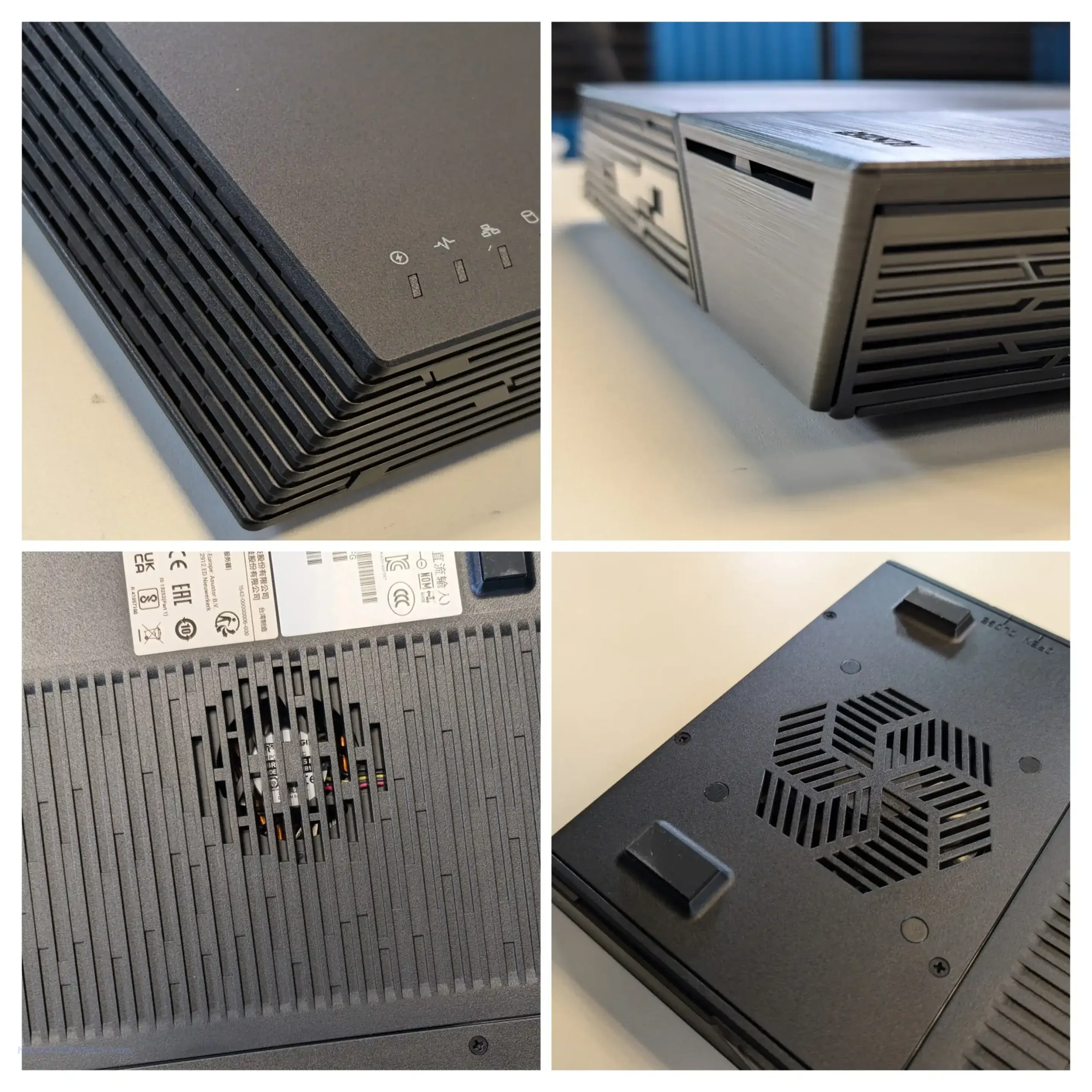
The choice of hardware components further solidifies its status as a high-performance NAS.
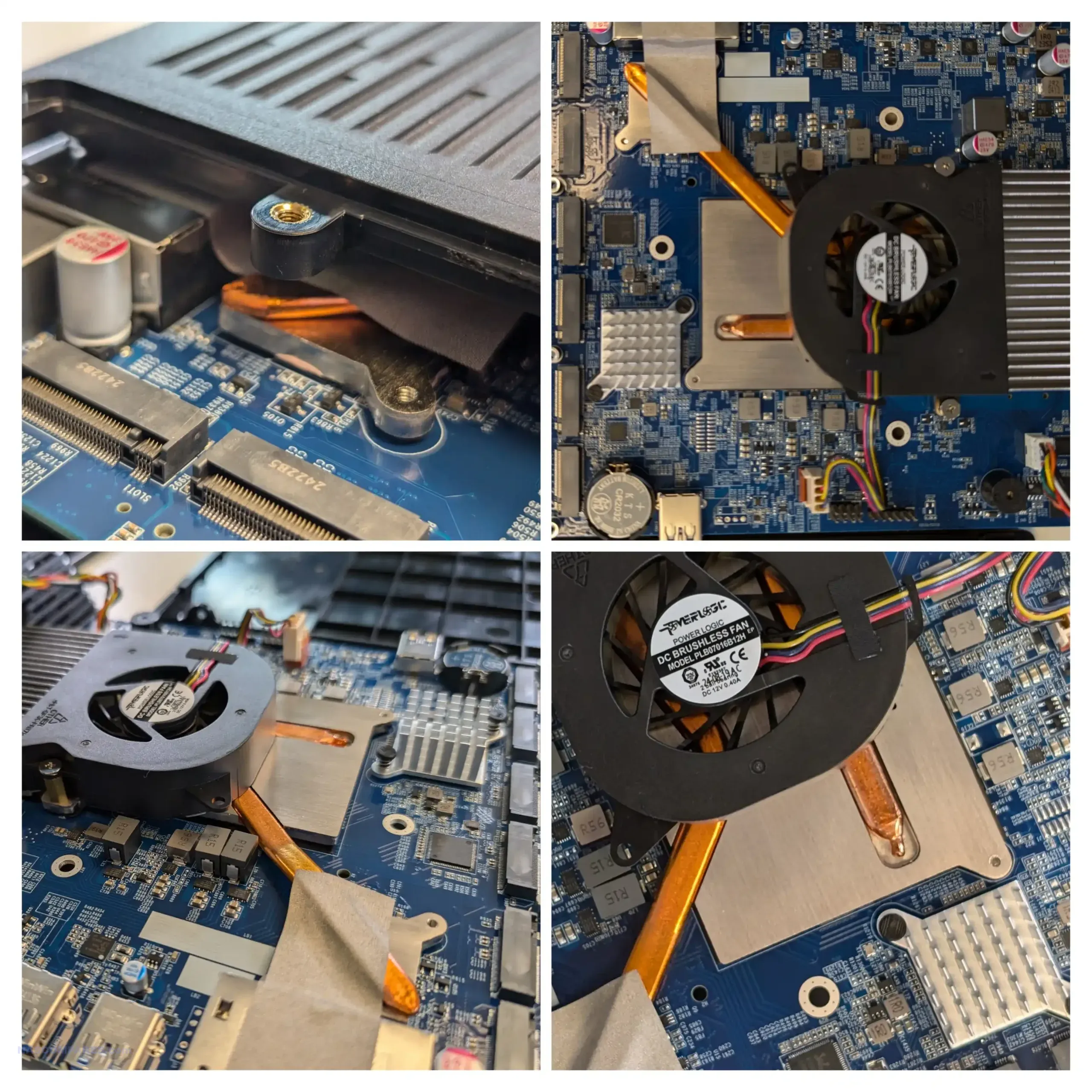
At the heart of the device is the AMD Ryzen Embedded V3C14 processor, a quad-core CPU clocked at 2.3GHz with a boost speed of up to 3.8GHz.
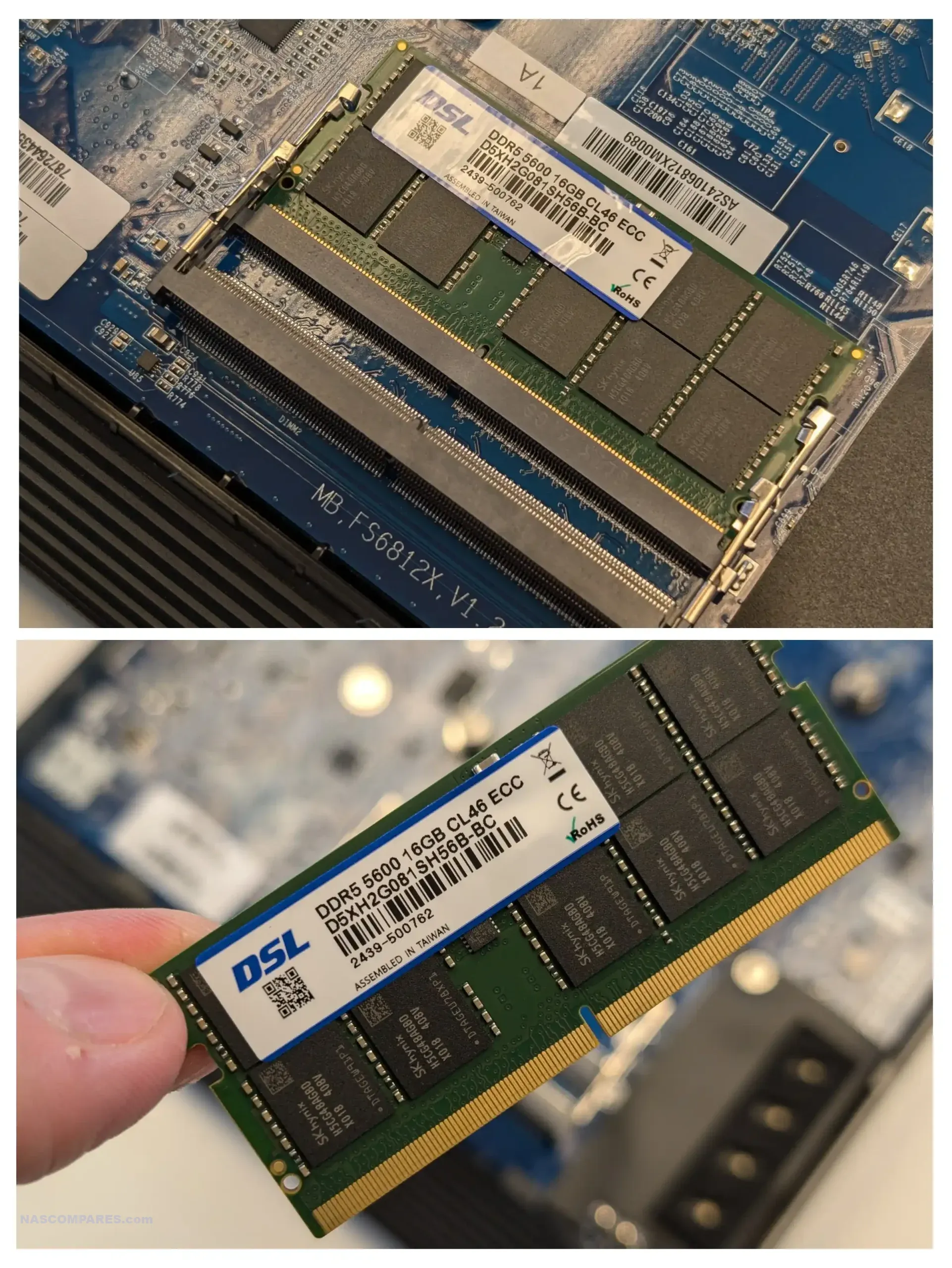
It supports 16GB of DDR5-4800 ECC memory, which is expandable up to 64GB, catering to users with intensive storage and processing requirements. ECC memory enhances data reliability, making this NAS suitable for mission-critical workflows.
| Component | Details |
|---|---|
| Processor | AMD Ryzen V3C14, Quad-Core, 2.3GHz (boost 3.8GHz) |
| Memory | 16GB DDR5-4800 ECC (Expandable to 64GB) |
| M.2 Slots | 12 x M.2 NVMe |
| Network | 2 x 10-Gigabit Ethernet |
| USB Ports | 2 x USB 4.0 (Type-C), 3 x USB 3.2 Gen 2 (Type-A) |
| Power Supply | 120W External Adapter |
| Dimensions (mm) | 48.3 (H) x 308.26 (W) x 193 (D) |
| Noise Level | 18.6 dB |
The system’s chassis is thoughtfully designed for durability and accessibility. Internal components, such as the NVMe slots, are easily accessible for maintenance or upgrades. The 12-bay configuration maximizes storage potential, making it ideal for users managing large-scale projects or requiring extensive data redundancy.
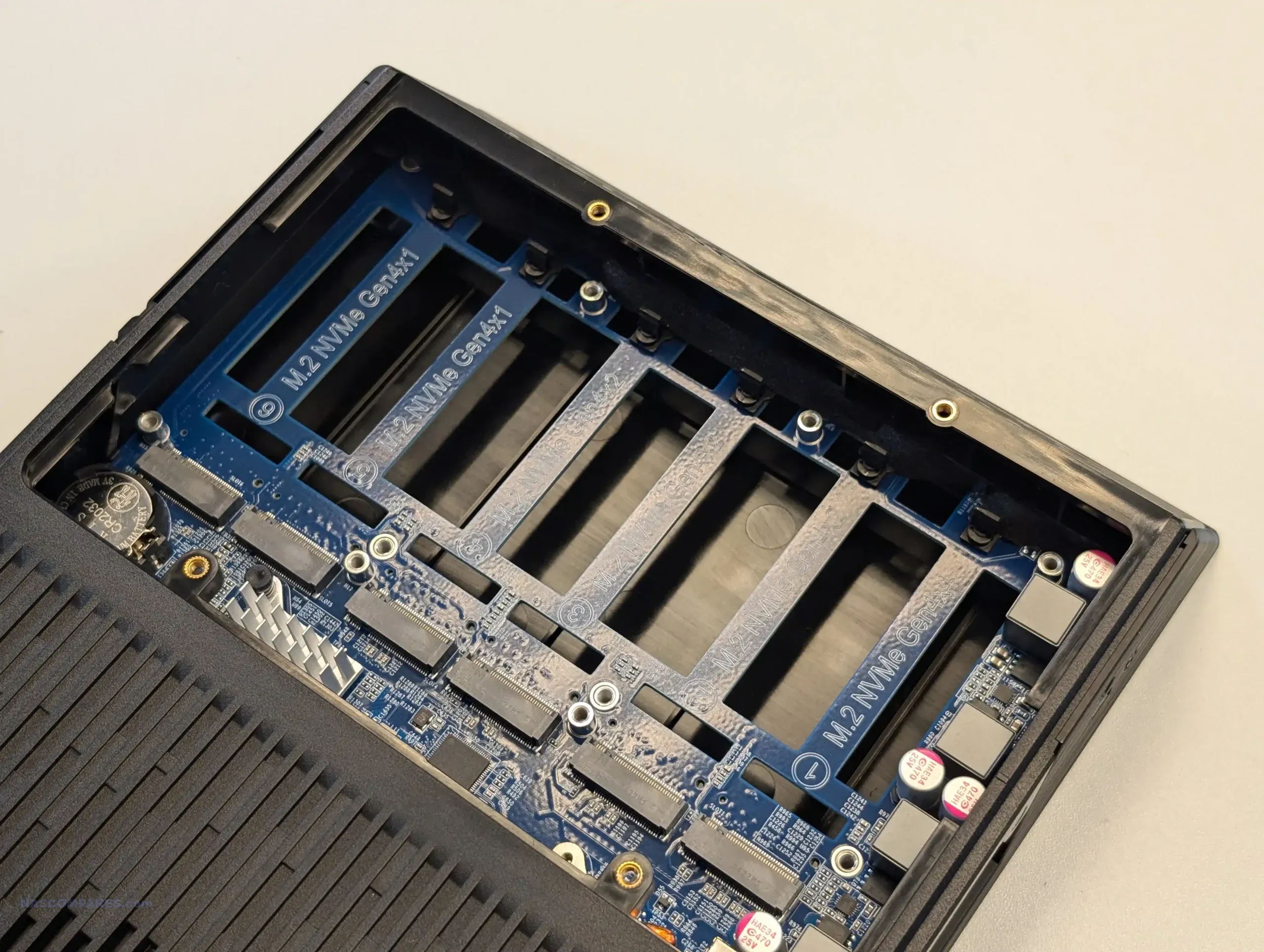
Despite its compact size, the Flashstor Gen 2’s design includes practical enhancements for thermal efficiency, which we’ll discuss further in the performance section. Overall, the hardware selection and physical layout highlight Asustor’s focus on balancing power and practicality.
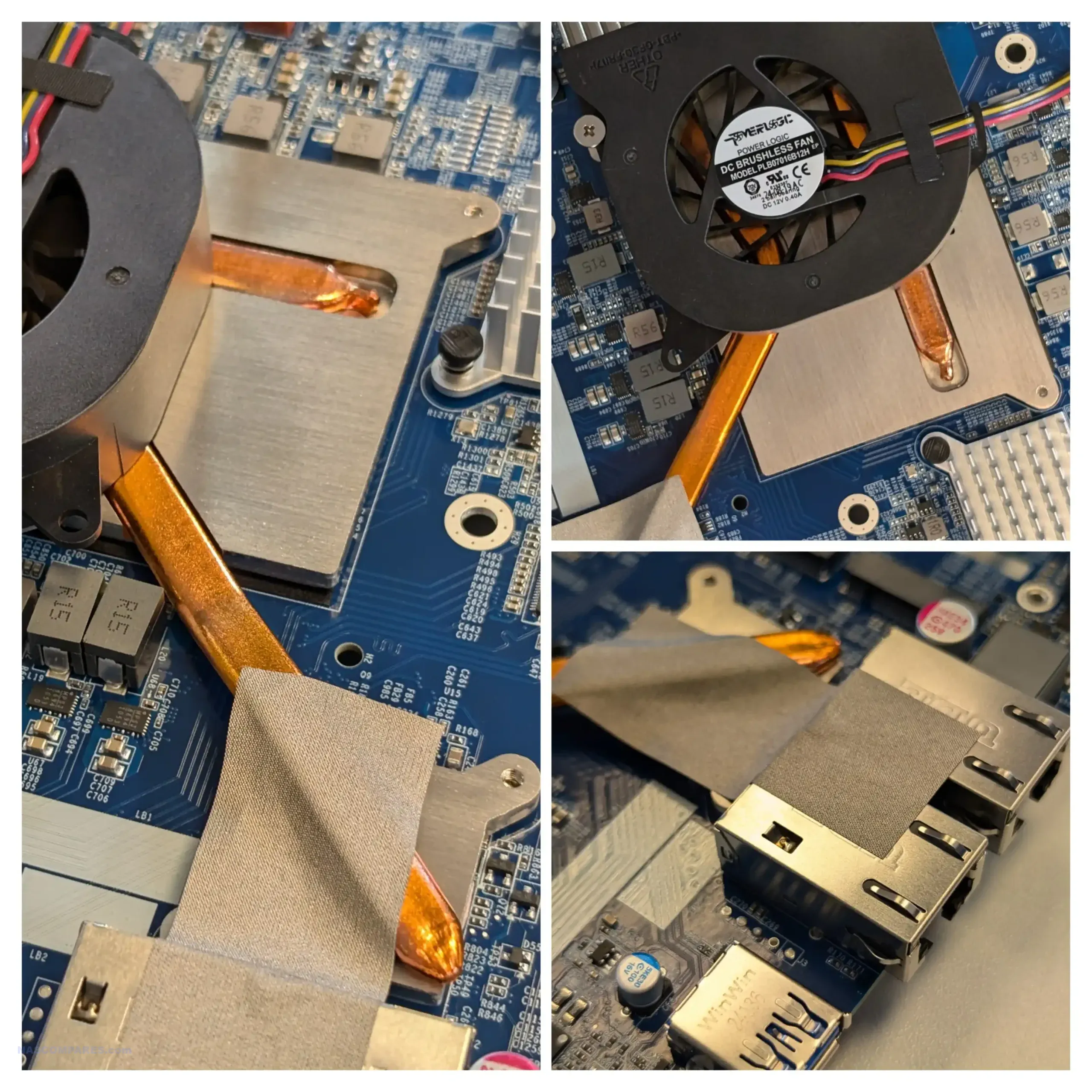
Performance and Heat Management on the Flashstor Gen 2
The Flashstor Gen 2 is engineered to deliver top-tier performance, leveraging its powerful hardware and advanced connectivity.

Testing showed the device consistently saturating single 10-Gigabit Ethernet connections during file transfers, with dual connections offering even greater throughput.
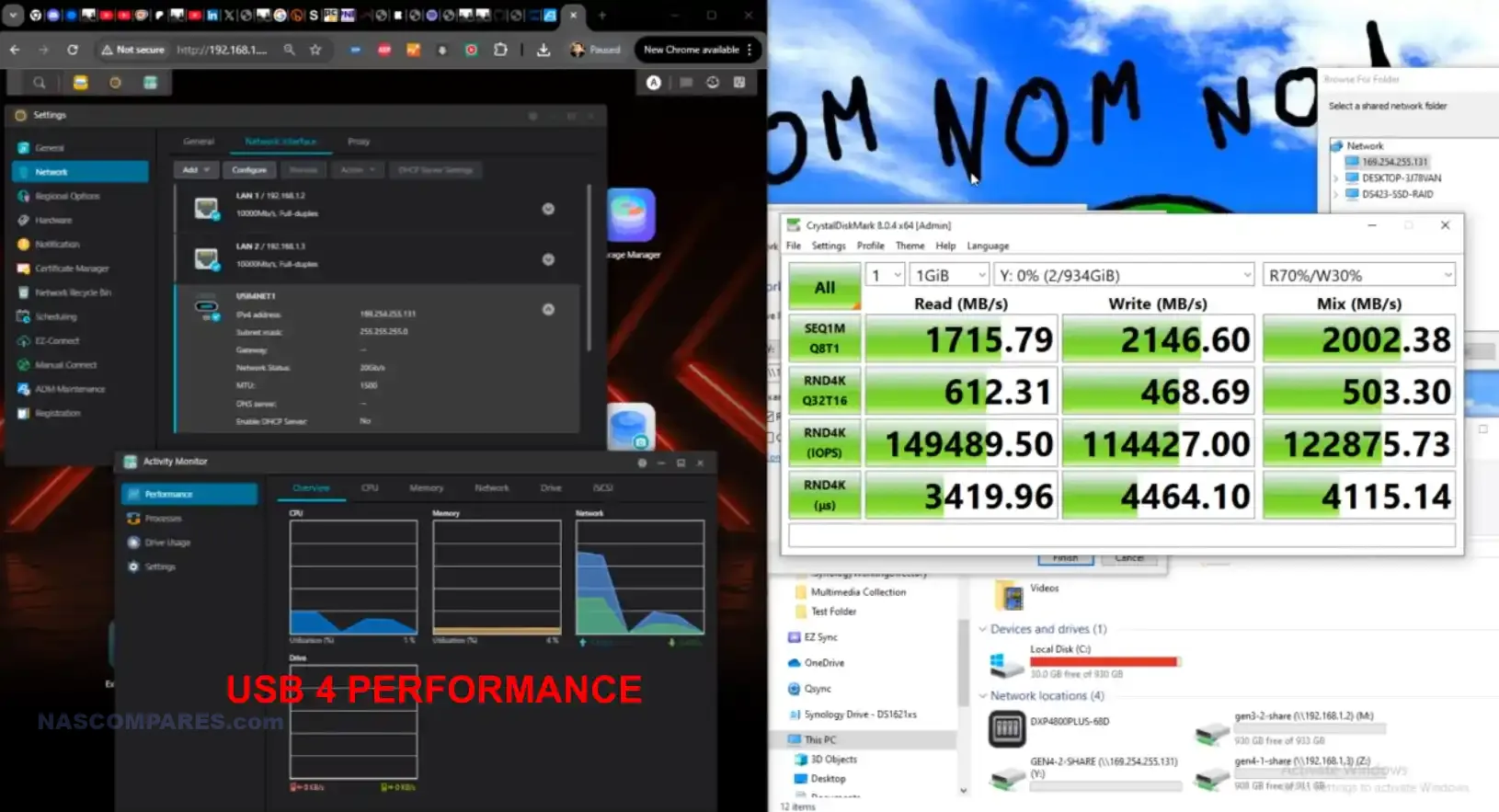 Its USB 4.0 ports also demonstrated exceptional performance, exceeding 1,700 MB/s in single-threaded tests. These results underscore the NAS’s ability to handle high-demand workflows like video editing and real-time collaboration.
Its USB 4.0 ports also demonstrated exceptional performance, exceeding 1,700 MB/s in single-threaded tests. These results underscore the NAS’s ability to handle high-demand workflows like video editing and real-time collaboration.
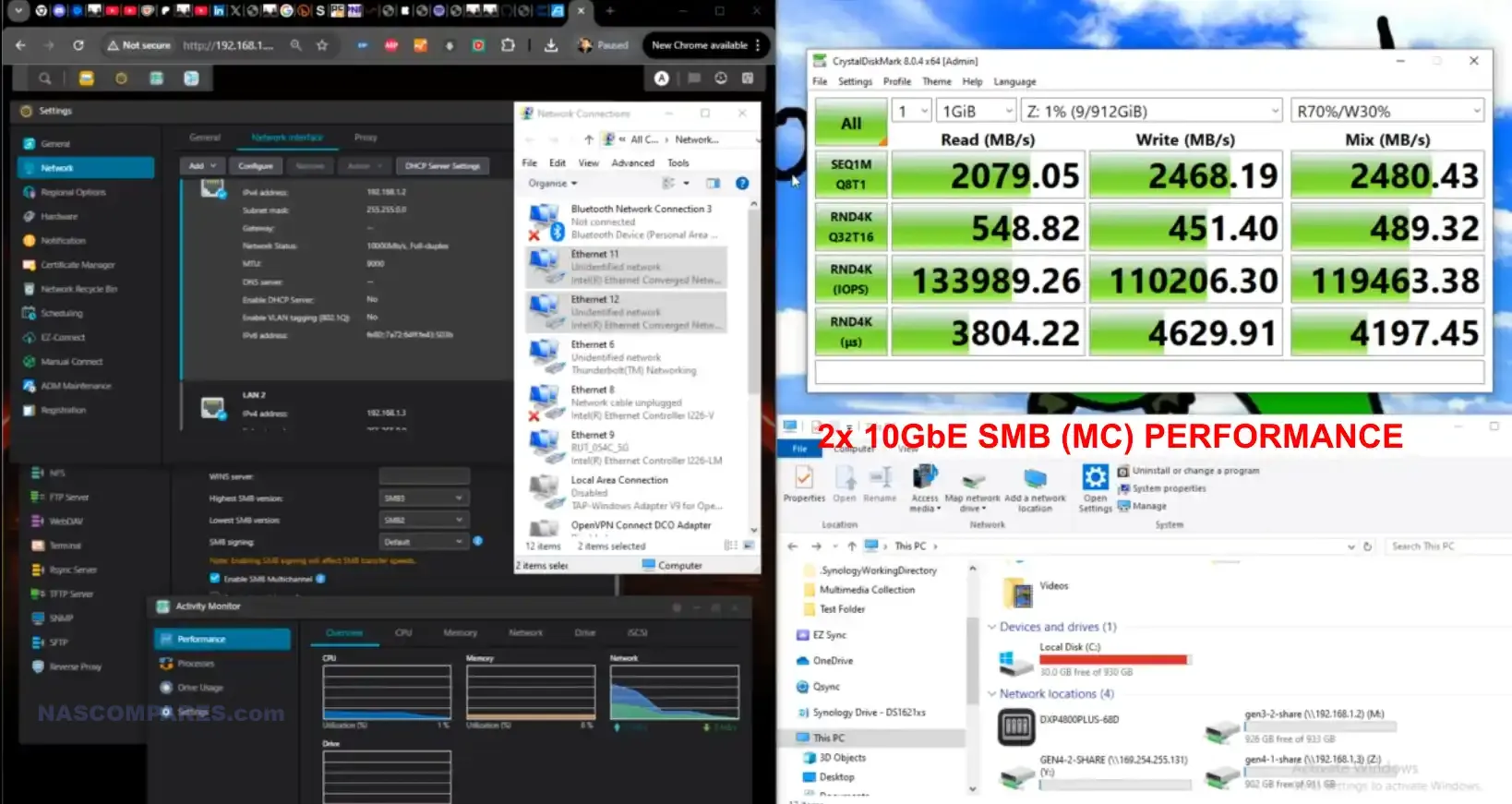
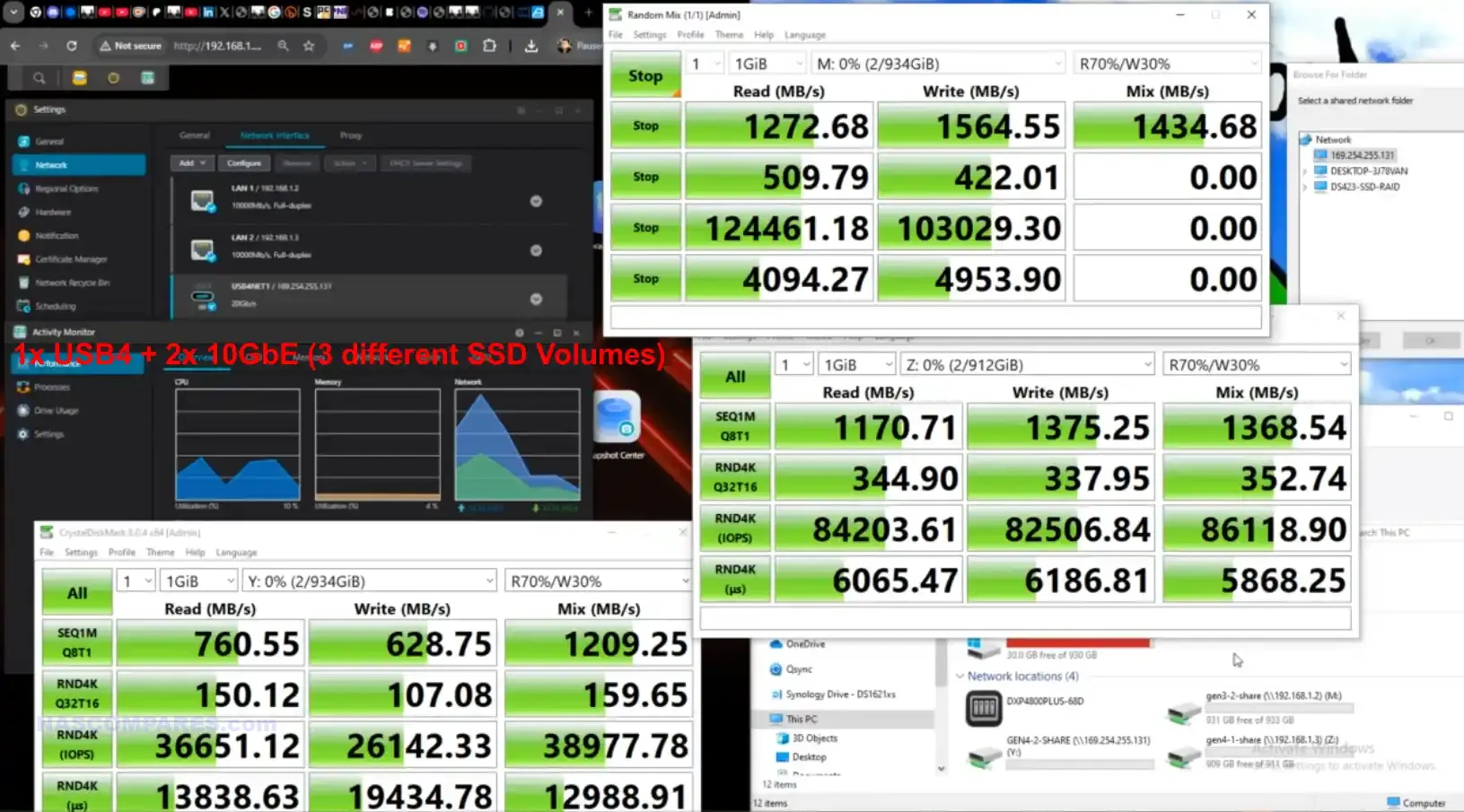
Thermal management is a crucial consideration for SSD-based NAS devices, and Asustor has made notable efforts in this area. The Flashstor Gen 2 employs dual cooling fans, one dedicated to the CPU, as well as copper heat pipes to dissipate heat from the M.2 NVMe slots. These measures effectively manage the heat generated by the Gen 4 SSDs, which maintained stable temperatures during intensive use.
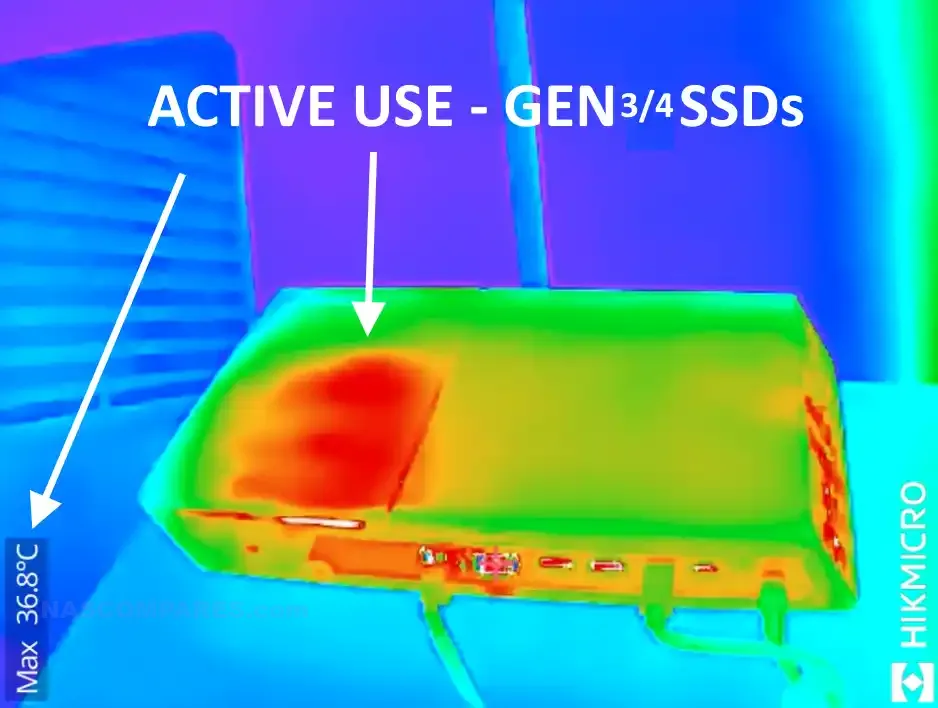
However, some limitations remain. The top-mounted M.2 drives lack active cooling, resulting in localized heat buildup during prolonged usage. While temperatures remained below critical thresholds during testing, the absence of heat sinks for the M.2 slots is a noticeable drawback, particularly for users planning continuous heavy workloads. Asustor could address this with an included cooling solution to better accommodate the higher heat output of Gen 4 drives.
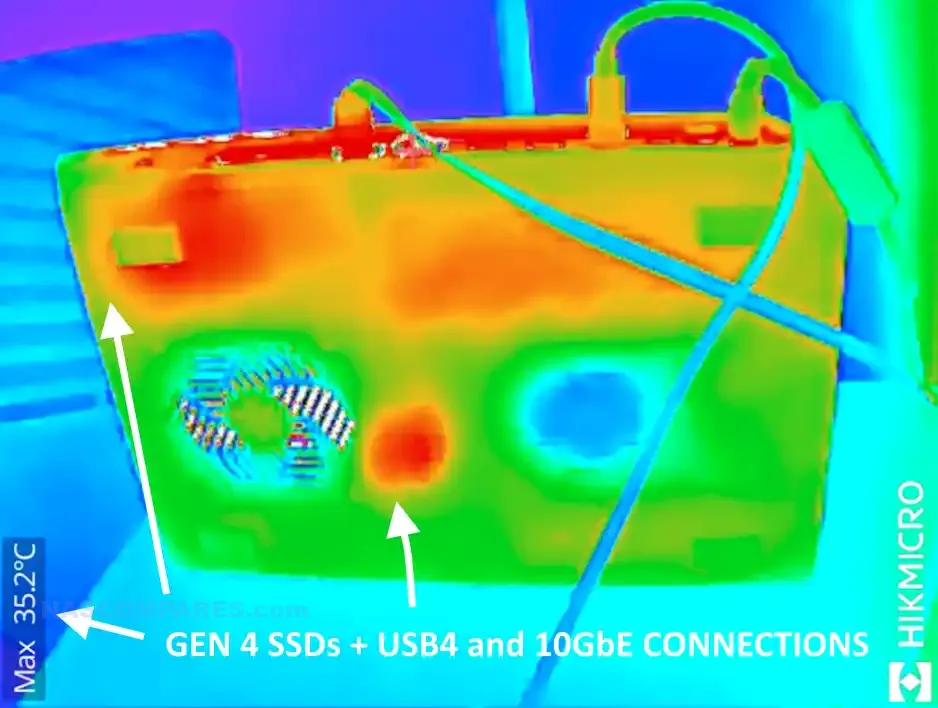
Power consumption during operation was modest, averaging 32.2W and peaking at 56W under load. Coupled with the efficient thermal management and quiet operation, these characteristics make the Flashstor Gen 2 a solid choice for 24/7 use in professional environments where noise and energy efficiency are priorities.
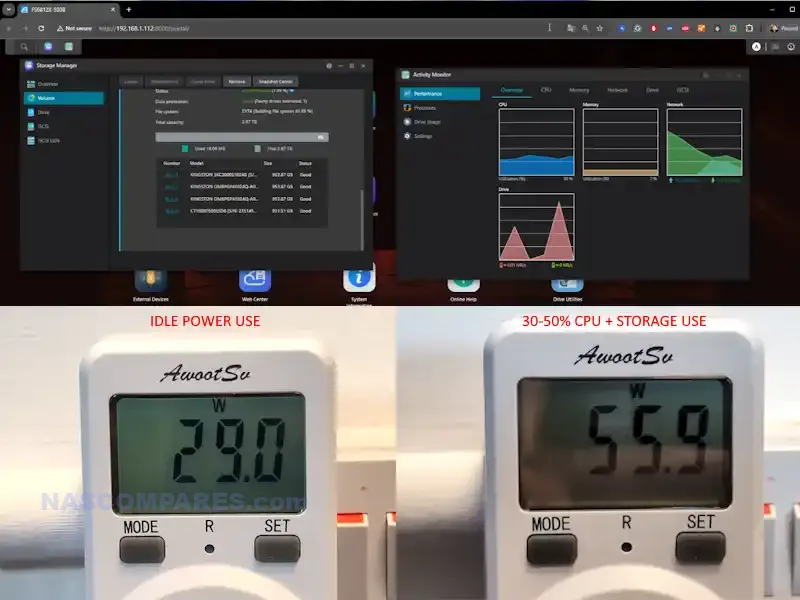
Flashstor Gen 2 Storage Configuration and Lane/Speeds
The storage configuration of the Flashstor Gen 2 offers immense potential, with 12 M.2 NVMe slots enabling substantial storage arrays. However, the allocation of PCIe speeds across these slots is uneven, leading to a complex setup process. The slots are divided as follows:
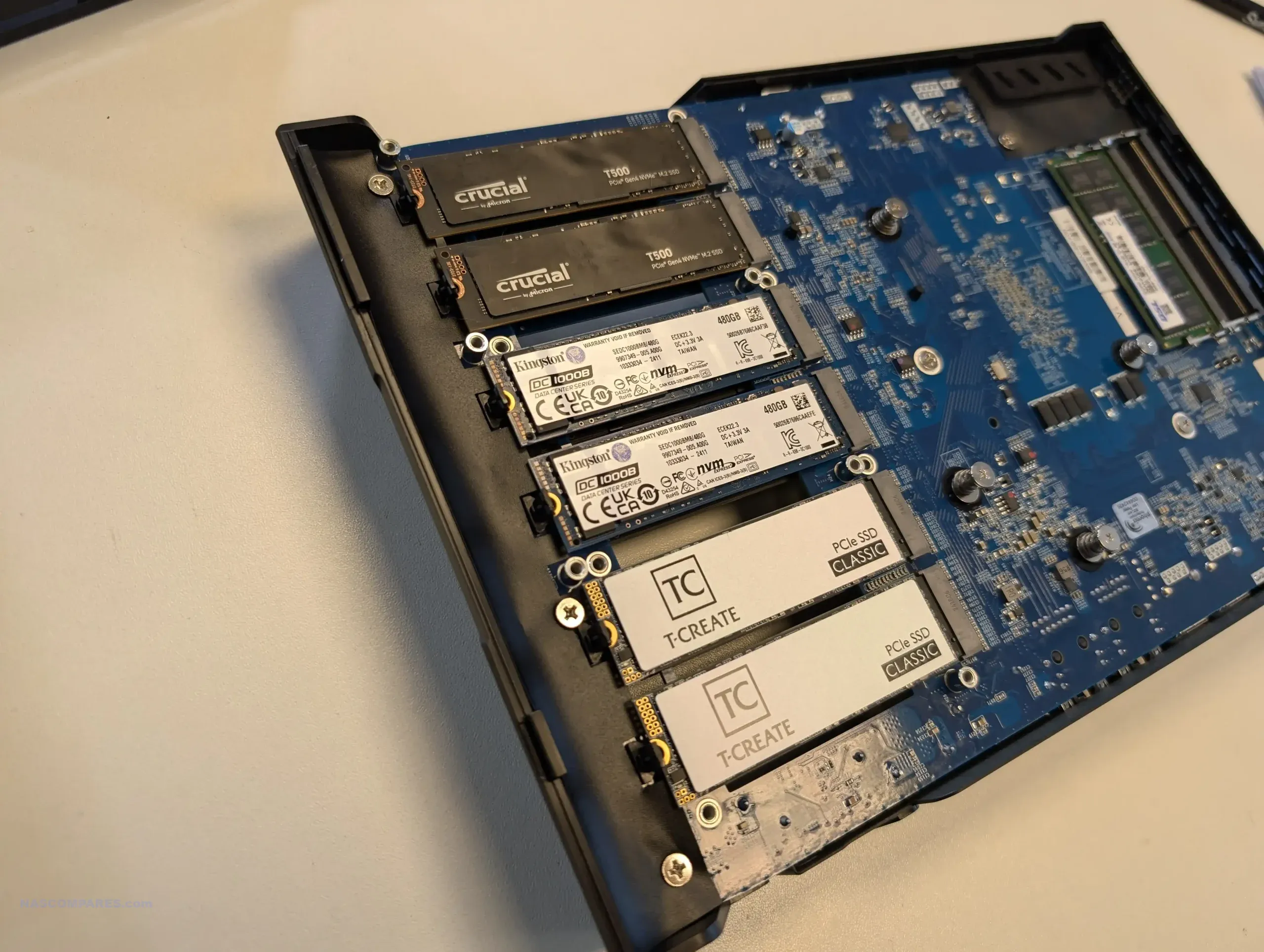
- 1 x Gen 4×4
- 3 x Gen 4×2
- 4 x Gen 4×1
- 1 x Gen 3×4
- 1 x Gen 3×2
- 2 x Gen 3×1
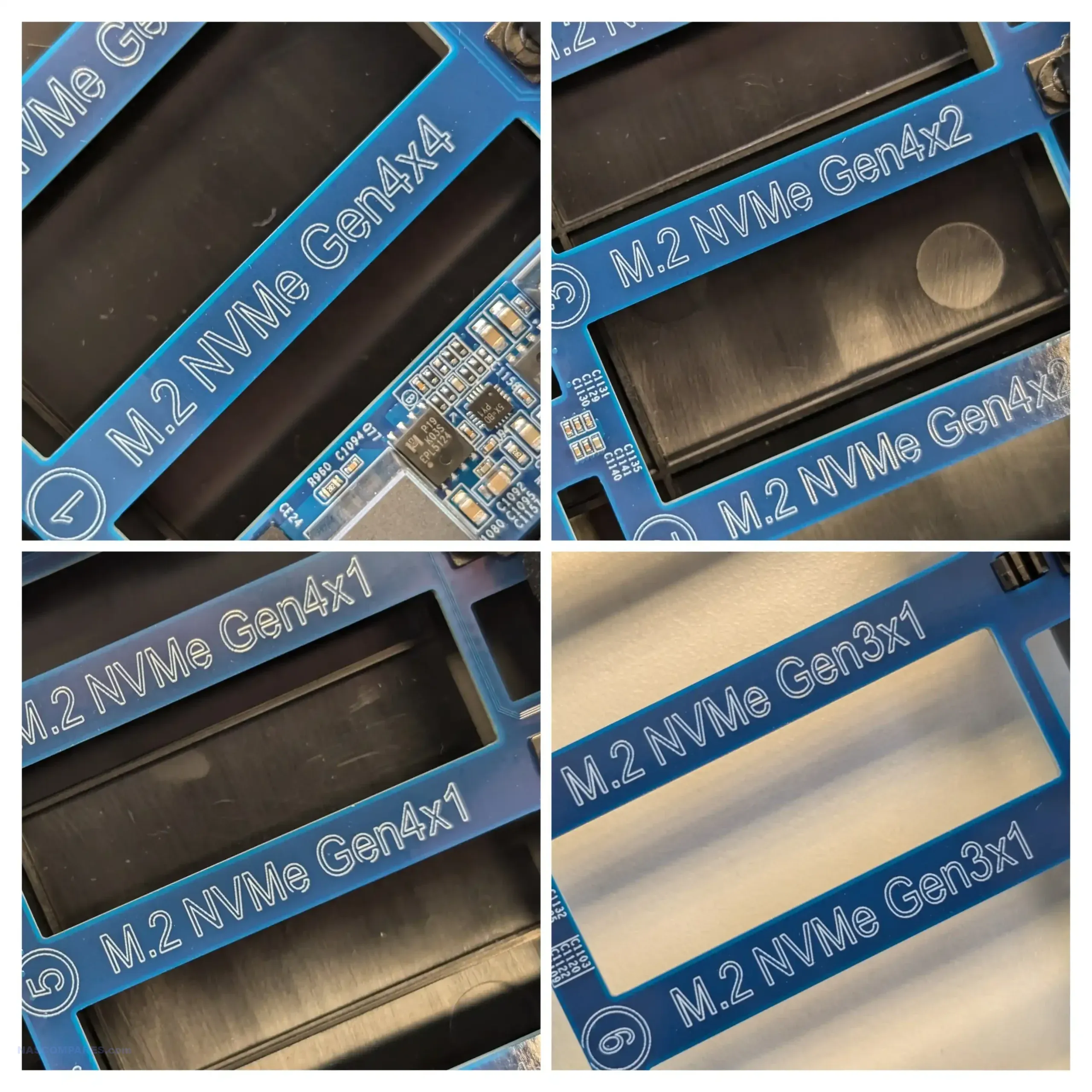
This configuration allows for flexibility but also introduces challenges for users seeking uniform performance across RAID arrays. It is more practical to configure the drives into multiple independent pools rather than a unified array, as the differing speeds can create bottlenecks. For users planning large-scale data storage, careful planning of drive allocation will be essential.
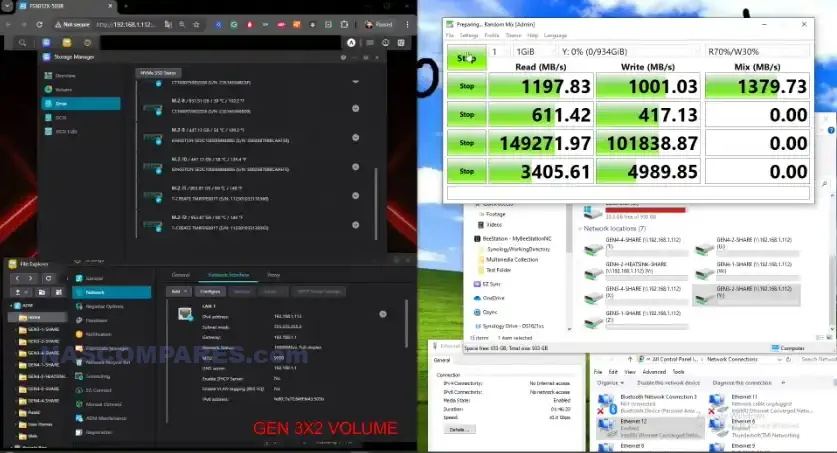
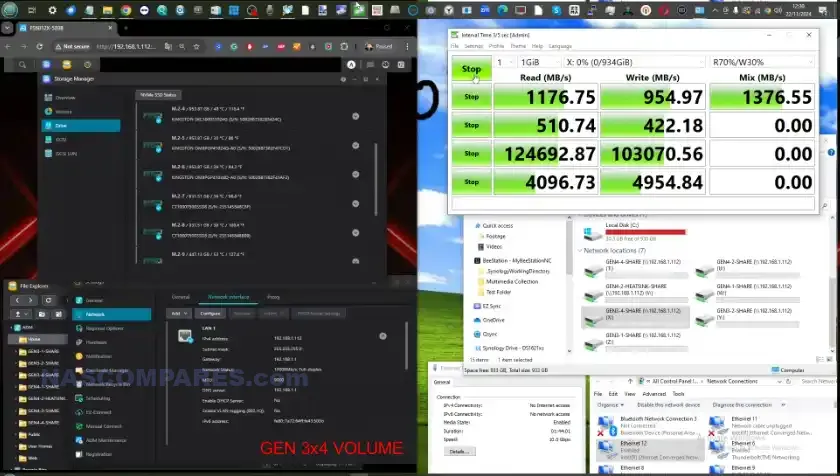
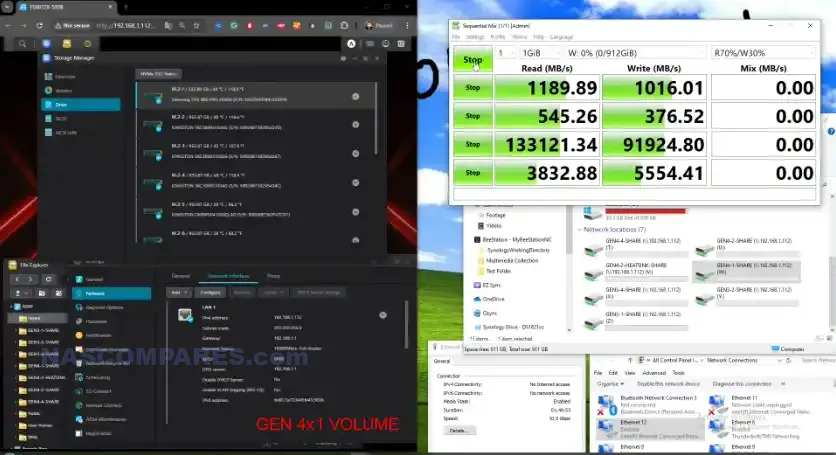
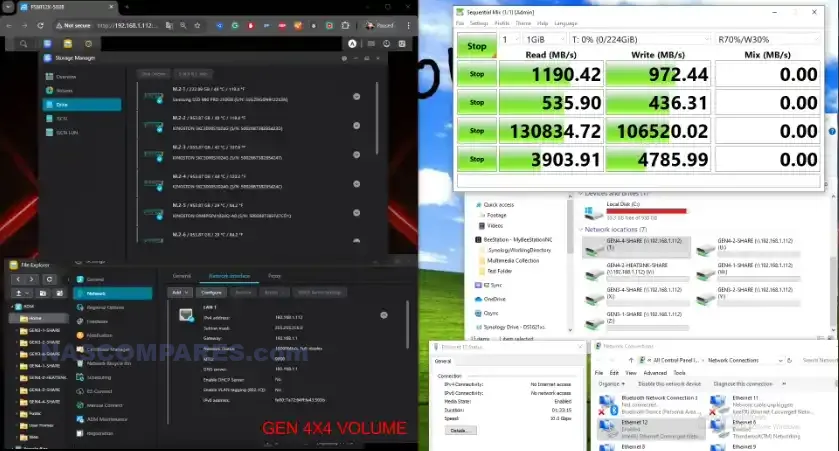
Despite this complexity, the performance of individual slots was impressive. Single 10GbE connections were fully saturated during file transfers, while multi-channel configurations demonstrated even greater throughput. Testing with dual 10GbE connections showed that the device could handle heavy data loads across different RAID pools simultaneously.
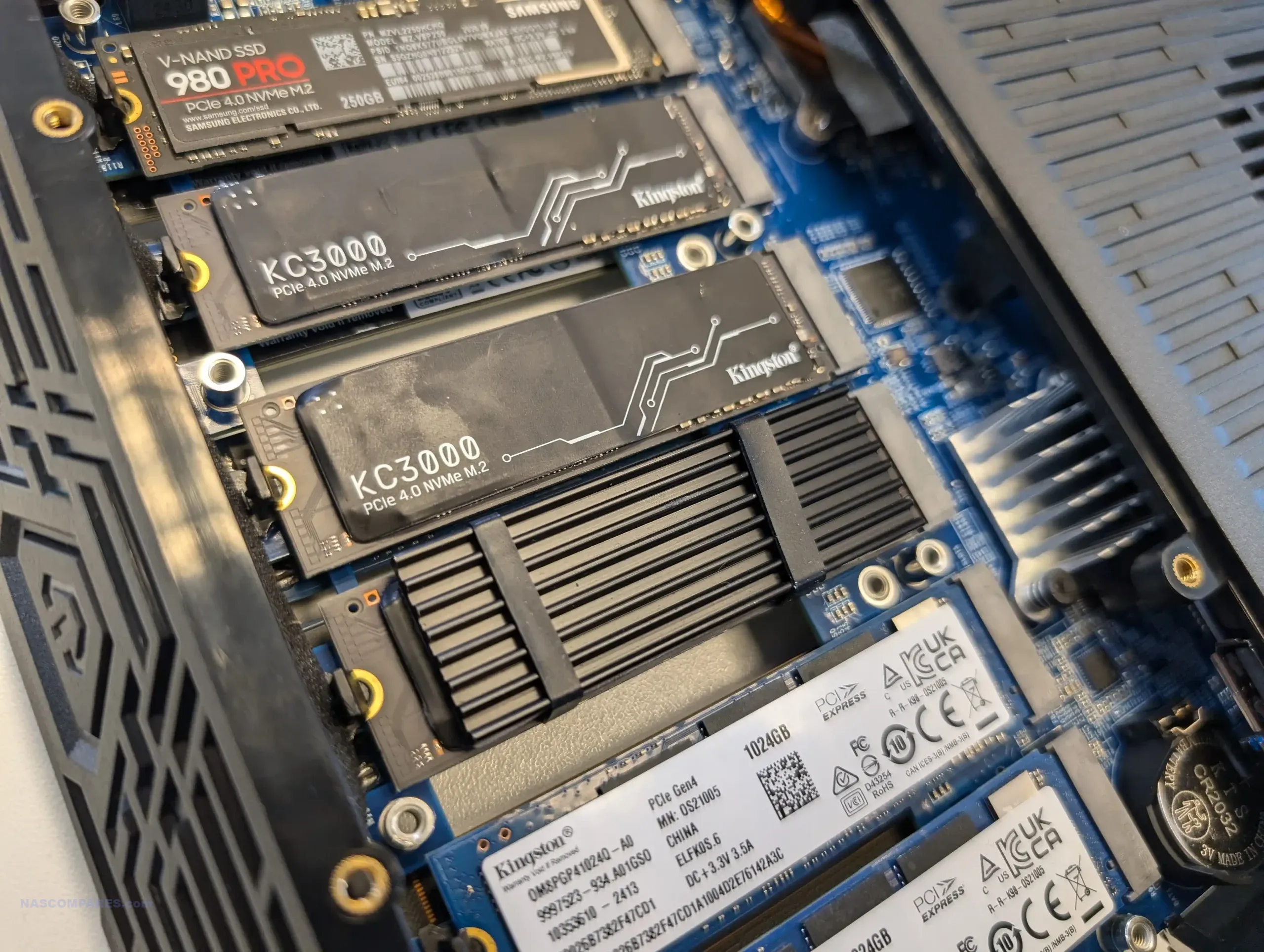
For professionals with demanding storage requirements, the Flashstor Gen 2 offers the capacity and speed to meet their needs. While the mixed PCIe speeds might deter some users, those with the technical expertise to optimize configurations will find significant performance benefits.
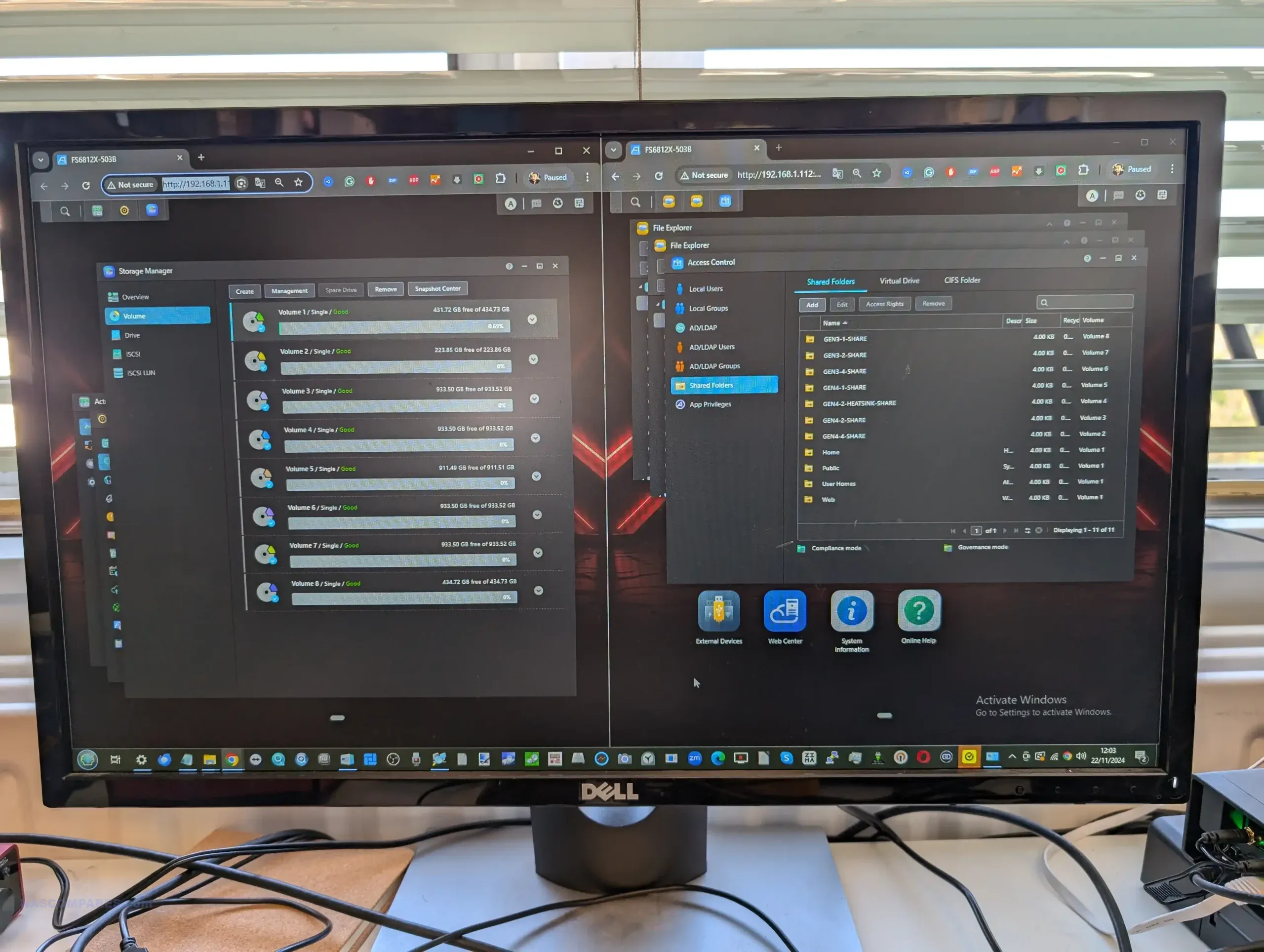
Flashstor Gen 2 Ports and Connections
The Flashstor Gen 2 offers an impressive array of ports, catering to a variety of workflows and setups. The device includes dual 10-Gigabit Ethernet ports, two USB 4.0 Type-C ports, and three USB 3.2 Gen 2 Type-A ports, ensuring ample connectivity for both networked and direct-attached use cases.
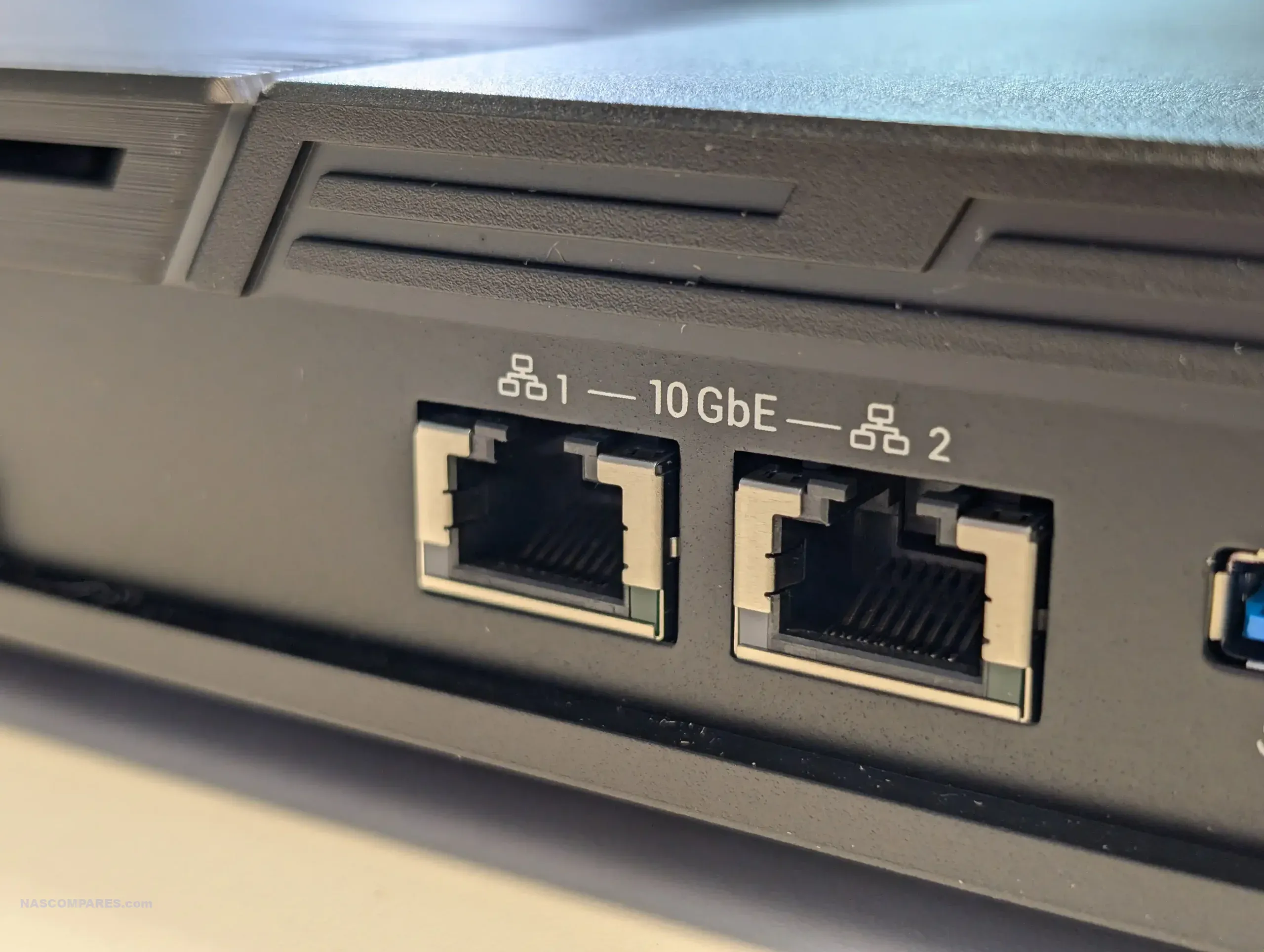
The dual 10-Gigabit Ethernet ports provide high-speed networking capabilities, supporting SMB multichannel for simultaneous data streams. This feature is especially useful for collaborative environments or workflows requiring simultaneous access by multiple users. During testing, the dual connections consistently delivered excellent throughput, making them ideal for demanding tasks such as video editing or real-time data processing.
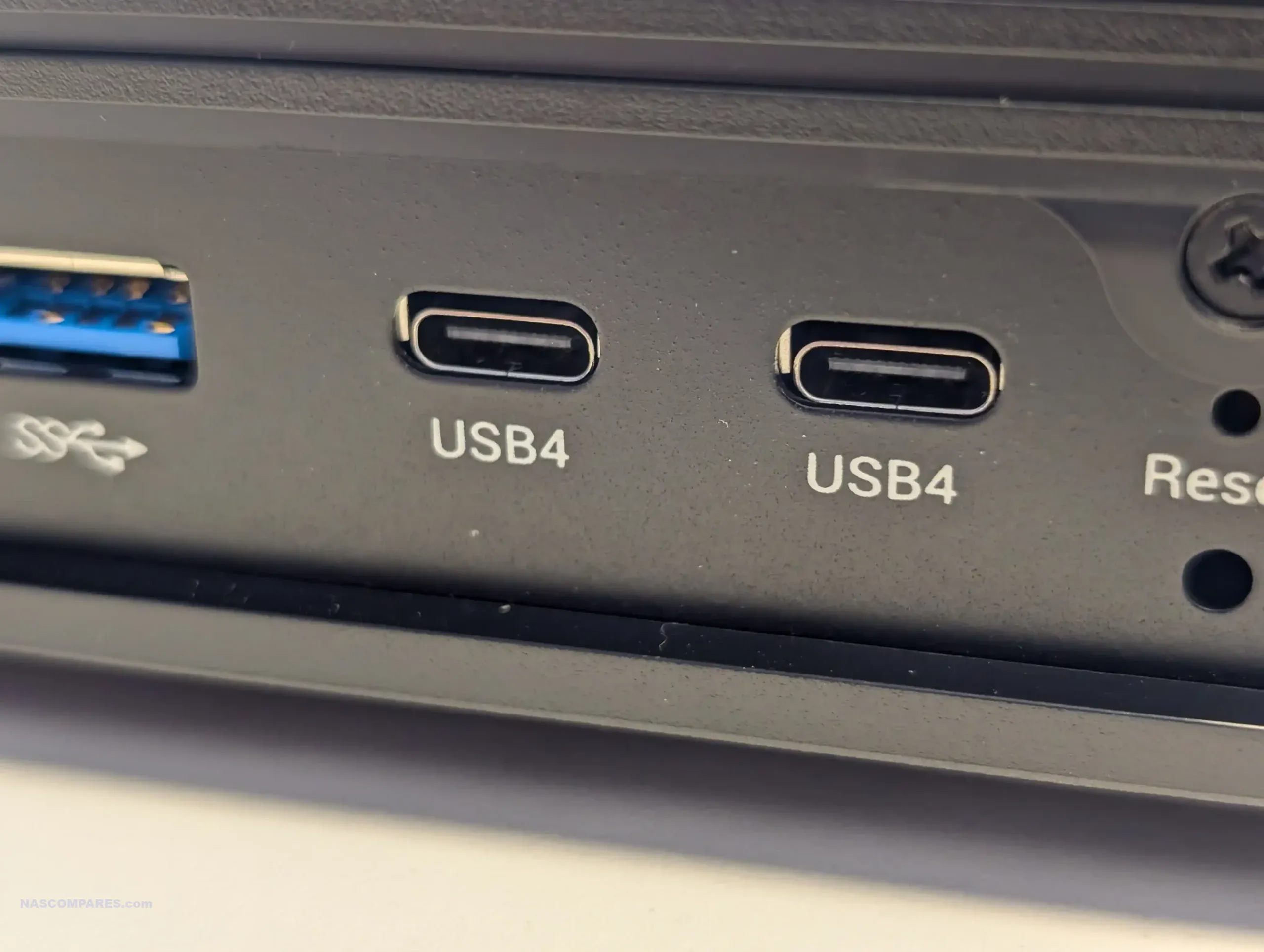
The USB 4.0 Type-C ports are a standout feature, offering 20Gbps speeds each. These ports enable high-speed direct access to the NAS, expanding its use cases to include direct-attached storage scenarios. Testing showed that these ports performed exceptionally well, with transfer speeds exceeding 1,700 MB/s, making them a valuable addition for professionals needing rapid data access.
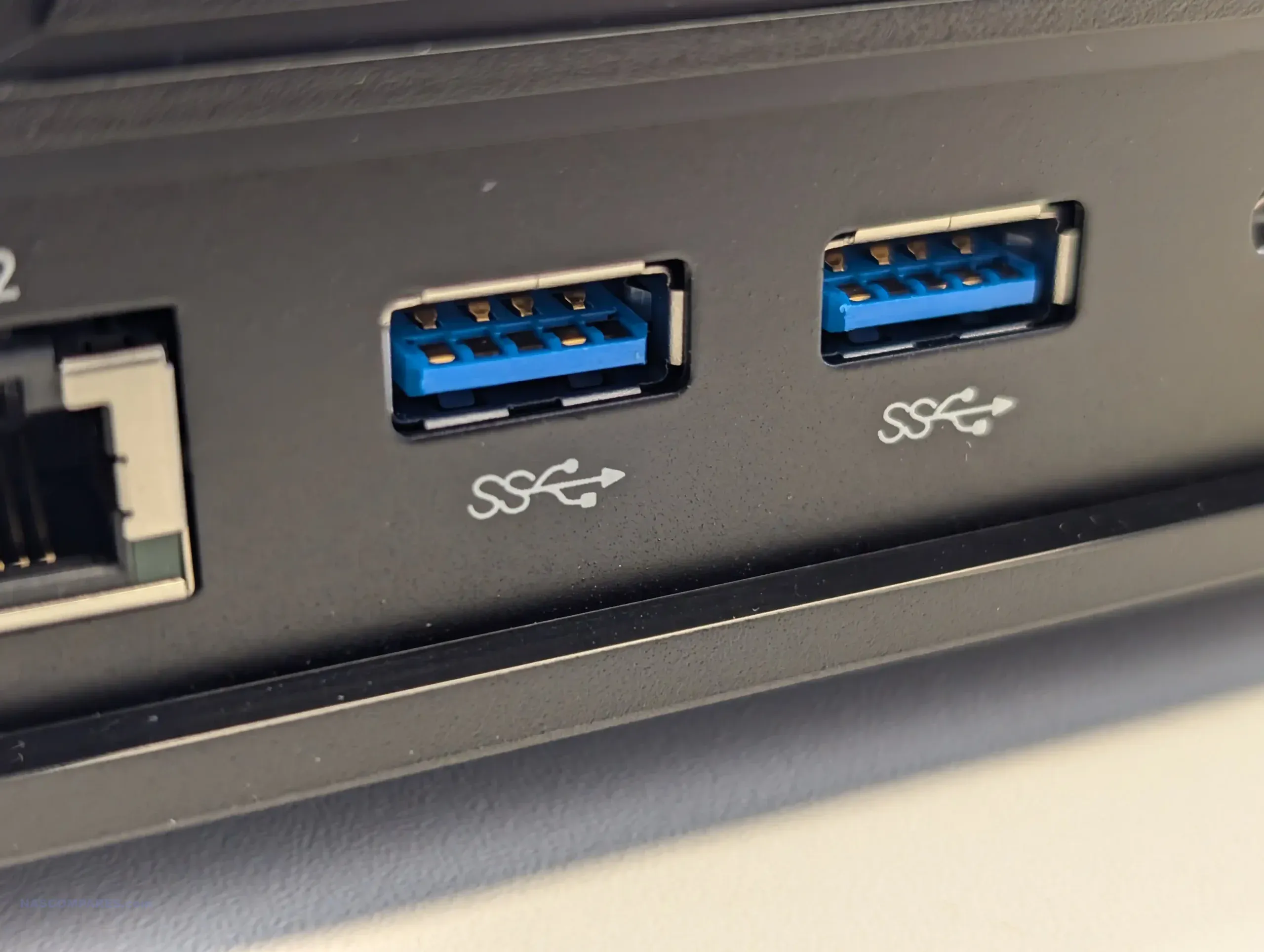
The three USB 3.2 Gen 2 ports add further versatility, supporting 10Gbps speeds for external storage devices or additional peripherals. Together, these ports create a highly adaptable system capable of integrating seamlessly into diverse workflows. Whether used for networking, direct storage access, or peripheral connections, the Flashstor Gen 2’s ports make it a flexible and powerful tool for professionals.
Asustor Flashstor Gen 2 NAS Software – ADM5
The Asustor AS6812X NAS arrives with the latest version of ADM 5 included. Additionally, this software receives frequent updates to ensure that the software runs the very best it can on the Lockerstor, as well as keeping up to date with security patches and application versions. The NAS software is accessible via a web browser and displayed very much like a normal computer operating system (desktop, user accounts, customizable themes, file management, running multiple tasks in windows that can be switched in the native tabs), but there are also a range of desktop client tools for accessing the NAS on your local machine natively, as well as a whole bunch of mobile applications that allow tailored access from your phone/tablet in more task-specific means (eg a photo app for viewing pictures and creating phone backup routines, a video app for enjoying your movies and boxsets, surveillance app to access your cameras, etc). There is also a large range of support of 3rd party applications too in the ADM platform. Asustor is not as big a company as the likes of Synology and QNAP, whole put ALOT more money into their software development, but Asustor try to counter this by (when they do not have an in-house app) making native versions of 3rd party tools in their platform (example, they do not have a 1st party Virtual Machine app, but DO include huge support for VirtualBox). The platform is not quite as fully featured as DSM and QTS, but it is still a very smooth and accessible software platform. The app center has a few more 3rd party applications and slightly crowbarred software (eg the Amazon Media and Streaming service plugins) that is not updated up the original uploaders anywhere near enough (leading to running issues on these tools), but the 1st party apps run very well. The big takeaway on the Asustor software and it’s services is that the standard class of expected features of a modern NAS in 2024/2025 are here and run exactly as you would want, it is just some of the additional ones that other platforms have doubled down on (such as AI-related services in Photography and Surveillance for example) that are a little lacking. That said, the brand has definitetl ramped up a number of the key security protocols and settings in the default setup.
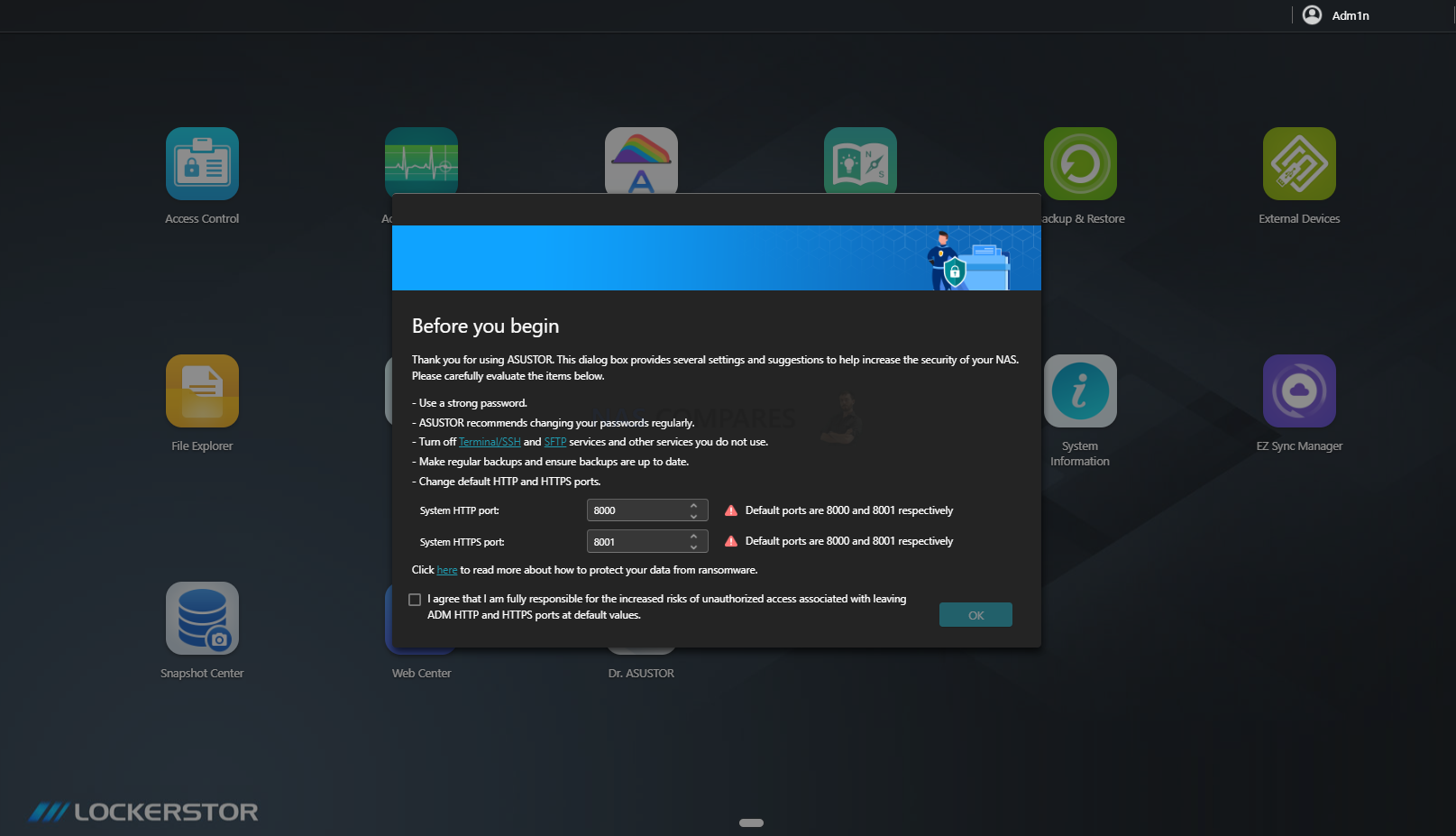
LooksGood Media App – Built-in three main video library categories; movies, TV shows, home movies and smart video sorting management
-
- The efficient global search function allows for searches by keywords followed by the execution of more detailed searches for the purpose of finding categories of movies, TV shows, home movies and parameters such as actors, director, year, genre, writer and title
- Attractive poster wall and thumbnail display
- Automatic production of video poster thumbnails
- Centralized management and ability to configure the order of favourites and playlist history
- The system administrator is able to configure video library and editing permissions according to user preferences
- Can configure access permissions to share with
- Multimedia conversion feature
- Self-defined smart folder for video conversions
- Supports digital TV recordings via digital
- Easy streaming with Chromecast and DLNA
- Supports playback of videos in Apple TV via AiVideos tvOS version
Plex – Hardware Transcoding (with a Plex Pass) is likely and with 1080p handled very well indeed, as well as some Plex 4K transcoding in H.265 (upto 60-80Mb bitrate) and the majority of H.264 Media upto 100Mb bitrate
Virtual Machines – A graphical embedded CPU like the one here will run Windows 10 and Android VMs very well. With the added support for Ubuntu and Hackintosh with VirtualBox. Then there is the option to scale up that memory to allow smoother VMs
Storage Management – BTRFS Support, as well as EXT4 for the traditionalist, Multiple Snapshot storage and browsing for recovery, a large number of ISCSI and LUN target creation, fast-acting SSD caching use. Remember that those M.2 NVMe SSD Bays can be used as both raw Pools and Caching
Network Management – Support of LAG, Load Balancing and virtual switches, as well as maintaining top transmission over 2.5/5/10Gbe for editing or gaming over the network. As well as Jumbo Frame control, DDNS automation, Wake on LAN support and internet/external NAS access with EZ Connect
Backups – Supporting a wide range of multi-tiered backup options that can be carried out simultaneously thanks to the powerful CPU in the Lockerstor and Nimbustor NAS systems, such as network RSync, USB Backups, NAS-2-NAS migration, Cloud Backups with Google Drive, Dropbox and Backblaze and numerous RAID levels internally for redundancy.
Content Management – Numerous Content Management Systems (CMS) and Customer Relationship Managers (CRMs) available in 1st and 3rd party forms, with simultaneous operations supported by this NAS
User Account Control – Supporting over 4,000 accounts, each with its own bespoke privileges and access levels, as well as grouping methods to automate the process easily
Security – AES 256bit hardware encryption on data in/out of the device, as well as over backup methods, with the Intel Celeron CPU in the AS6812X maintaining high R/W speeds throughout, as well as Windows ACL permission and configuration, auto blacklisting and multiple VPN provider support
Antivirus (ClamAV) – Scheduled Scans, Automatic Virus Definition Updates, Quarantine Infected Files
Download Center – Supports BT(Torrent & Magnet Link), HTTP and FTP Downloads, Torrent Search, Bandwidth Control, RSS Subscription and Automatic Downloading (Broadcatching), ASUSTOR Download Assistant for Windows & Mac
DropBox, OneDrive and Google Drive Sync – Each ADM Account is Able to Individually Log into one cloud Account, supporting Sync, Directly Upload Files to cloud from the NAS, or from cloud to NAS
Mail Server – Each ADM Account can Become an Independent Email Account, Provides SMTP, IMAP and POP3 Mail Protocols, Spam Filter and Black List Settings, Antivirus Scanning for Emails, Exclusive Email Backup Mechanism, Auto-Forwarding and Auto-Response Protocols
Photo Gallary – “Album” and “Browse” Viewing Modes, Manage Photo Album Access Rights: Public Access, Restricted to Certain Accounts, Album Password, Multi-level Folder Structure Support, Supports Tagging of Photos, One-click Sharing to Social Media (Facebook, Google+, Twitter, Plurk, email), Intuitive Drag and Drop Management, Slideshow Viewing Mode, Supports a Wide Range of Image Formats: JPG/JPEG, GIF, PNG, BMP, TIFF, RAW and Supports Video Playback
Surveillance Center – Up to 64 channels in 720p on single live view display, On-screen camera controls including camera PTZ, manual recordings, take snapshots, configure camera settings and open Maps, Up to 4 channels of synchronous and non-synchronous playback with audio, Intelligent video analytics including motion detection and foreign object detection, Supported Browsers: Windows Internet Explorer, Microsoft Edge, Firefox, Mac Safari, Mac Firefox ESR, Event notification supports SMS, E-mail, and mobile push notification, AiSecure mobile app for iOS and Android with Push notification, Maximum IP Cam (4 Free Licenses; Additional Licenses to be Purchased)
Takeasy – Download from YouTube, Vimeo, Twitch and More, Selectable Video Type and Quality, Automatic Downloads with YouTube or Twitch Subscriptions, Preview Downloads in Progress and Online Playback
SoundsGood Audio App – Import Personal/Public Music Collection, Personal/Public Music Collection Permission Control, Playlist Editor, ID3 Tag Editor, Local Speaker Support: HDMI, USB, Audio Jack, Supported Audio Formats for Browser: MP3, WAV, Ogg, Supported Audio Formats for Transcoding Through Browser: AIFF, Flac, Supported Audio Formats for Local Speaker: MP3, WAV, Ogg, AIFF, Flac
Backup Tools – Rsync (Remote Sync) Backup, Cloud Backup, FTP Backup, External Backup, One-Touch Backup, EZ Sync, Btrfs Snapshots
These are just the tip of the iceberg and I will be going into more ADM 3.4 and AS6812X applications in the Software Review.
Here is how the Asustor ADM platform compares with the Synology DSM platform:
Flashstor Gen 2 Review Verdict & Conclusion
The Asustor Flashstor Gen 2 12-Bay NAS is a powerful and adaptable solution, tailor-made for professionals and enthusiasts who require cutting-edge storage capabilities. Its impressive hardware—featuring dual 10-Gigabit Ethernet ports, USB 4.0 connectivity, and support for up to 12 M.2 NVMe drives—delivers performance that stands out in a crowded NAS market. Compact and efficient, it strikes a fine balance between raw power and practicality, making it an attractive choice for content creators, video editors, small businesses, and anyone needing high-speed, scalable storage. One of the key strengths of the Flashstor Gen 2 lies in its ability to handle demanding workflows. Whether you’re working on 4K video edits, hosting large-scale backups, or supporting collaborative environments with simultaneous access, this device consistently delivers reliable and rapid performance. The inclusion of USB 4.0 ports offers unparalleled flexibility, providing direct access for rapid transfers or external connectivity at speeds that rival the fastest storage solutions available today. These features position the NAS as more than just a storage system—it’s a versatile tool capable of meeting a variety of professional demands.
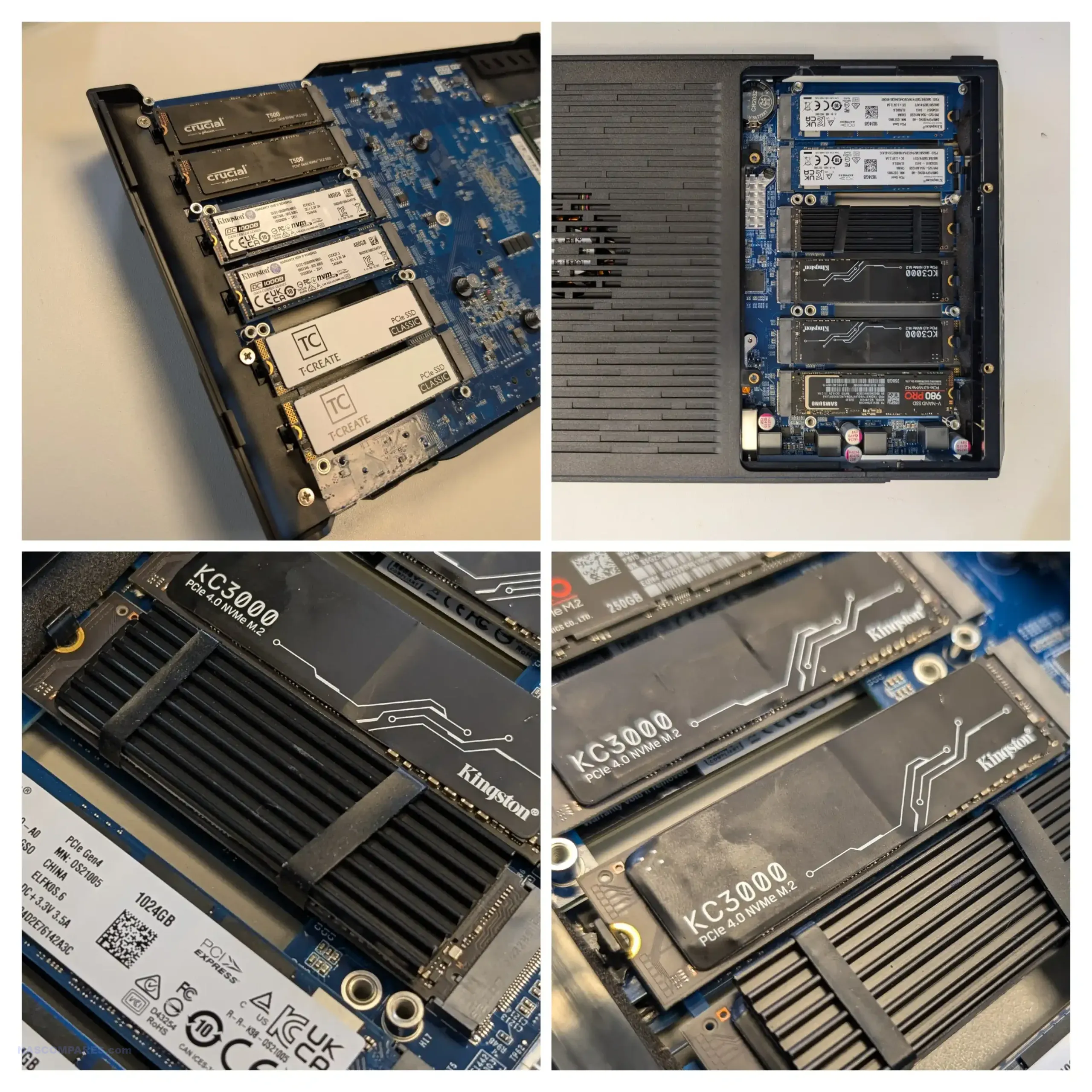
However, it’s not without its quirks. The mismatched PCIe speeds across the M.2 slots introduce complexity for users looking to create uniform RAID configurations, while the lack of M.2 heat sinks means additional planning is required to manage potential heat buildup, especially with high-performance Gen 4 drives. These limitations are not deal-breakers but do underscore the importance of understanding the device’s intricacies to get the most out of it. Users who are willing to invest time in optimizing their setup—or add aftermarket cooling—will find that these drawbacks are relatively minor in the grand scheme of what the Flashstor Gen 2 offers. Another standout feature is its quiet and efficient operation, making it ideal for 24/7 use in environments where noise and energy consumption are concerns. This is particularly relevant for studios, offices, or home setups where distractions must be kept to a minimum. Despite its compact design, the Flashstor Gen 2 handles thermal management effectively, leveraging dual fans and copper heat pipes to maintain stable temperatures during intensive tasks. Its power efficiency is equally commendable, ensuring it won’t become a burden on operating costs even when running continuously.
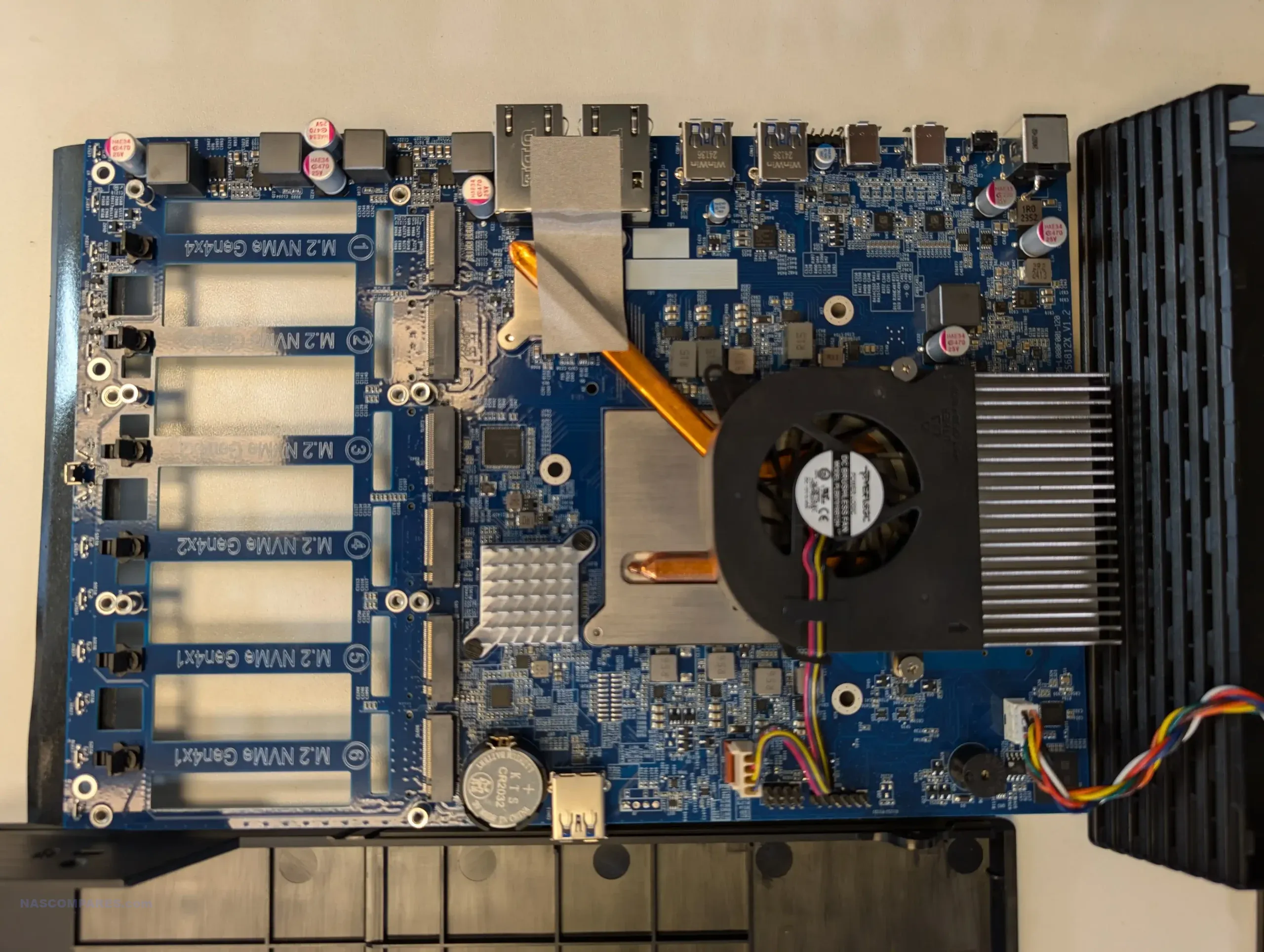
For those who prioritize hardware capabilities and performance above all else, the Flashstor Gen 2 delivers on its promises with aplomb. It’s a system built for those who value speed, flexibility, and scalability, though it does require some technical know-how to unlock its full potential. While it might not appeal to those seeking plug-and-play simplicity, it more than compensates with sheer performance and a robust set of connectivity options. In conclusion, the Asustor Flashstor Gen 2 is a forward-thinking NAS that sets a high standard for SSD-based storage solutions. It caters to professionals and enthusiasts who demand more from their systems, offering the tools and flexibility to manage the most complex storage needs. While not perfect, it is a device that rewards those who take the time to configure it properly, providing a storage platform that is both powerful and future-proof. For anyone serious about high-speed, reliable storage, the Flashstor Gen 2 is a worthy investment.
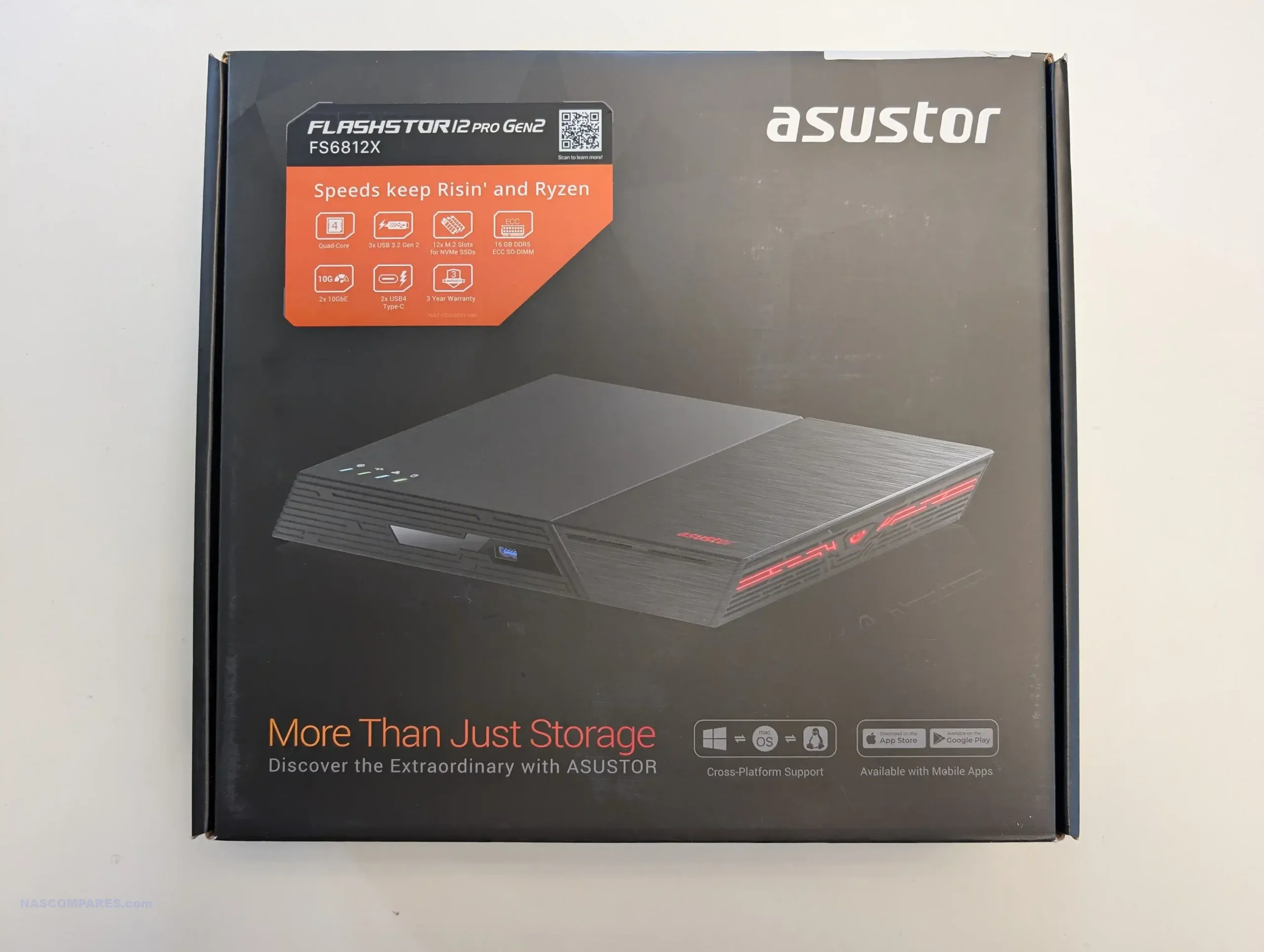
| PROs of the Asustor FS6812X Flashstor Gen 2 NAS | CONs of the Asustor FS6812X Flashstor Gen 2 NAS |
|
|
Need More Help Choosing the right NAS?
Choosing the right data storage solution for your needs can be very intimidating and it’s never too late to ask for help. With options ranging from NAS to DAS, Thunderbolt to SAS and connecting everything up so you can access all your lovely data at the touch of a button can be a lot simpler than you think. If you want some tips, guidance or help with everything from compatibility to suitability of a solution for you, why not drop me a message below and I will get back to you as soon as possible with what you should go for, its suitability and the best place to get it. This service is designed without profit in mind and in order to help you with your data storage needs, so I will try to answer your questions as soon as possible.
📧 SUBSCRIBE TO OUR NEWSLETTER 🔔
🔒 Join Inner Circle
Get an alert every time something gets added to this specific article!
This description contains links to Amazon. These links will take you to some of the products mentioned in today's content. As an Amazon Associate, I earn from qualifying purchases. Visit the NASCompares Deal Finder to find the best place to buy this device in your region, based on Service, Support and Reputation - Just Search for your NAS Drive in the Box Below
Need Advice on Data Storage from an Expert?
Finally, for free advice about your setup, just leave a message in the comments below here at NASCompares.com and we will get back to you. Need Help?
Where possible (and where appropriate) please provide as much information about your requirements, as then I can arrange the best answer and solution to your needs. Do not worry about your e-mail address being required, it will NOT be used in a mailing list and will NOT be used in any way other than to respond to your enquiry.
Need Help?
Where possible (and where appropriate) please provide as much information about your requirements, as then I can arrange the best answer and solution to your needs. Do not worry about your e-mail address being required, it will NOT be used in a mailing list and will NOT be used in any way other than to respond to your enquiry.

|
 |
(Early Access) M.2 to Oculink 4i Adapter - TURN £5 INTO 64Gb/s
(Early Access) Synology Active Protect - The End of Active Backup?
(Early Access) Jonsbo N5 NAS Case Build - GET IT RIGHT, FIRST TIME
(Early Access) 64TB USB Drives - How Does This SCAM Work?
(Early Access) Minisforum MGA1 7600M XT eGPU Docking Station Review
(Early Access) The Best M.2 SSD NAS To Buy Right Now
Access content via Patreon or KO-FI







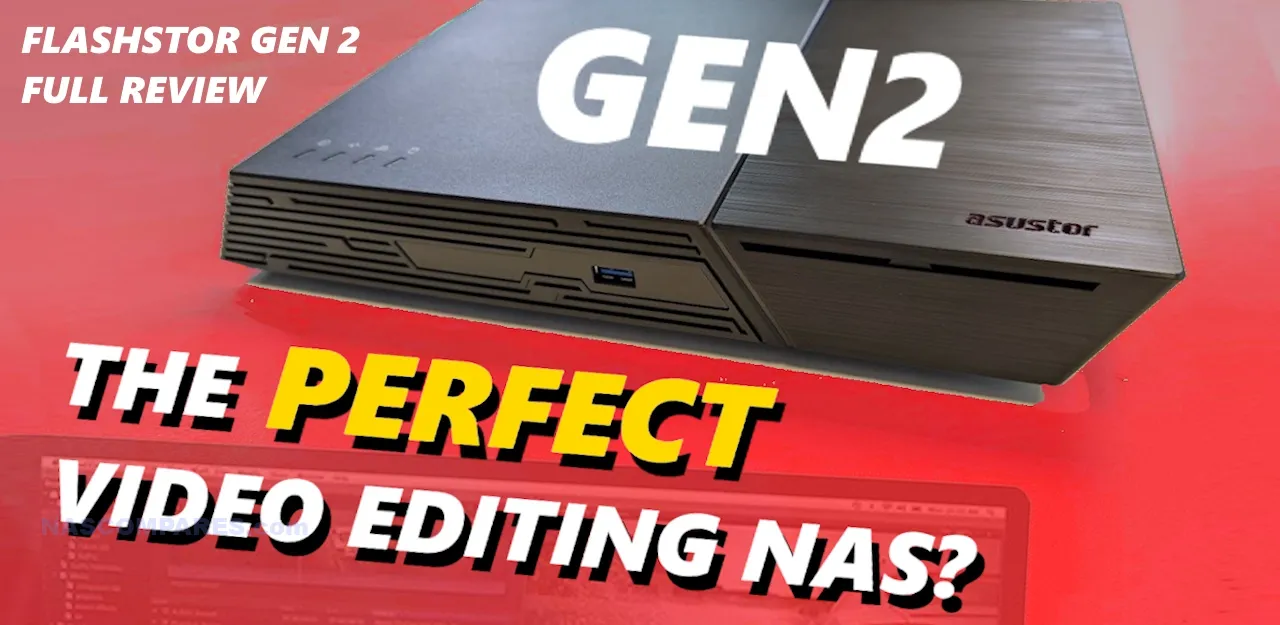





Wow huge price, almost 1600€ for the 12 bay. Im glad i have no use for a 12 bay. Looking at the 6 bay device 1150€ seems way overpriced in comparsion to the 12 bay.
Even the Gen1 is high in price. So i must say the Lincstation n1 you can get at 340€ atm at the lincplus website is a better deal, for me. It has already 16 GB of RAM and is more flexible.
Sure only one 2,5 LAN but has Wifi and Bluetooth, thats great if you only have Wifi availible. Bluetooth is handy sometimes too.
I dont use unraid for it, i found openmediavault more apealing and it supports the eMMC plus wifi and BT.
I can see that some ppl have a need for the Gen2 Asustore but my PCs running with inbuild 2,5 LAN, i have no faster network therefore the lincstation is more apealing and has a better valure for the money.
REPLY ON YOUTUBE
Wondering if the nvme drives can be raided with redundancy and making this 4 drive unit into technically 8 drive unit?
REPLY ON YOUTUBE
Yeahhhhh I think I’ll just build a nas for half that and with more than double the performance.
REPLY ON YOUTUBE
To complete Asustor’s marketing plan once you get good docker images or apps from Mother Duck and Crunchy Data. I would send out machines to Data Science influencer Jake Vanderplas at the Unviersity of Washington in Seattle (Jake is used to handling astronomical amounts of data, hint, hint) and to GIS influencer Paul Ramsey at Crunchy Data. If they say Postgres + Docker (or in Ramsey’s case Postrges + PostGIS + DuckDB) on ADM is good Asustor will get lots of sales.
REPLY ON YOUTUBE
If I was Asustor, I would send a gratis machine each to DuckDB Labs, Mother Duck and Crunchy Data and say can you develop a version of Postgres + DuckDB on this machine (native or Docker or Kubernets) in a cool way such as easy connectivity to cloud services and Amazon S3 storage? If you do, we will feature and promote it.
REPLY ON YOUTUBE
I have a Lockerstor 2 Gen 2 I’ll have to look but I’m on a 4.** version of ADM, I assume it will go to ADM 5 soon.
REPLY ON YOUTUBE
I currently own an ASUSTOR Flashstore FS67O6T. This AS6804T might be just the product I may want primarily because of the inclusion of USB4 Hopefully to provide a couple of enabling functions. About the USB4 x2 ports, is it possible to connect:
1. to a local PC to use as a DAS for local access? (i.e. video editing I/O, etc.)
2. to Thunderbolt 4 dock (Sonnettech Edge 20) to expand ports?
3. to a second NAS (FS6706T) to back up from FS6812X to FS6706T (currently owned)
REPLY ON YOUTUBE
You nailed the “context” perfectly Dude!
REPLY ON YOUTUBE
For any Mac buyers, please be aware that USB4 connectivity does not work at all (supposedly it’s coming in the future, but no timeframe has been given). This was confirmed by Asustor themselves in the caption of their recently posted video “USB4 Networking Guide” and in a comment on that video. Yes, this is the only place I could find them stating this. Bought this specifically for that feature, wasted a ton of time setting it up and trying over and over again to figure out why it wasn’t working.
Love this channel and I know Mac users are in the minority, but it might be worth throwing a note into the written review on your website to spare potential purchasers some frustration.
REPLY ON YOUTUBE
Is anyone using this for 4K video editing?
REPLY ON YOUTUBE
Can you please explain how to utilise the thunderbolt 4 port connecting it directly to a mac?
REPLY ON YOUTUBE
The M.2 disks are 10x as expensive as a 3.5″ HDD så it does not make any sense before M.2 price drop 70-80%
REPLY ON YOUTUBE
The materials used are top notch. The leather feels soft and luxurious, exactly like the real thing. The stitching is impeccable, with no loose or uneven lines. The hardware (including the iconic CC twist lock clasp) is durable, well made, and adds to the overall elegance of the bag kislux . I thought everyone who owned an LV monogram bag knew that it was obviously coated canvas? When people spend a fortune on an expensive bag, they might as well buy a replica
REPLY ON YOUTUBE
even though it does not have an iGPU I wish you would do a plex transcoding test just to see what the cpu can do.
REPLY ON YOUTUBE
Any idea if FS6812X supports TRIM for Raid 5 & 6? Earlier FS6712X did not.
REPLY ON YOUTUBE
@nascompares @ASUSTOR_YT Do you know where I can find a guide on how to create the USB4 connection to my PC and Mac?
I bought the 6 bay version and installed it according to the available guides. Only about the USB4 connection to my PC/Mac there is no information to be found anywhere.
REPLY ON YOUTUBE
Traduction de la vidéo très mauvaise, certaines phrases traduites en français ne veulent absolument rien dire.
REPLY ON YOUTUBE
Hi! Thank you very much for your videos, they are very helpful. I need to ask you something, what do I need to have for storage (I don’t need it to be a NAS) that I can share with two Macs to edit video? Thank you very much!
REPLY ON YOUTUBE
@NASCompares please could you give some pointers on how you connected the NAS to the PC by USB4… I like to think myself fairly tech savvy but I’m getting absolutely nowhere with it and there seems to be nothing in Asustor’s documentation about USB4 at all :/ Between the noisy CPU fan and not being able to get better than 10Gbps from this I’m starting to think I should be sending it back!
REPLY ON YOUTUBE
@NASCompares
Do you have the slot speeds for the 6-bay version? I tried to look in the Datasheet, but nothing is noted there…
REPLY ON YOUTUBE
Here’s a little engagement to say goodbye with. I can’t be watching your content simply because the way you say Ryzon instead of Ryzen winds me right up. Good luck.
REPLY ON YOUTUBE
Don’t understand, why there’s no nic to upgrade the speed to 2* 25gb/s… (the cpu can’t handle it) but as it is for the moment it’s useless..
REPLY ON YOUTUBE
I’ve been using Synology NAS systems, how does Asustor compare?
REPLY ON YOUTUBE
For 1300 USD, I can build a massive rig with 3 times more performance. Not sure what they were thinking of…
REPLY ON YOUTUBE
Does SSD with heat sink compatible with the SSD slots since there may be potential heat generating issue?
REPLY ON YOUTUBE
Slightly annoyed the USB4 is only 20gbps and not 40Gbps, but that’s still pretty awesome… Not that I’ve worked out how you actually do the direct USB connection yet and it’s not obvious in the manual! Thanks for the fan noise test – I think I must have a dodgy CPU fan as it’s rather noisy… Off to submit a support ticket, yay!
REPLY ON YOUTUBE
Excellent review thank you. What drives are recommended for this nas as only been used to buying spinning drives but defo want the 12 bay of this please?
REPLY ON YOUTUBE
The speed and port configuration makes no sense to me. If you can saturate a 10Gb NIC with a x1 slot, make the design simple and make all NVMe bays x2, like the enterprise market is moving towards. It makes no sense to release an all-flash NAS product like this and make a hodge-podge of PCIe speeds and link sizes. Just split the x8 and 2 of the x4 lanes into 8 x2 NVMe bays. Or PLX the x8 into 8 or 10 gen4x2 ports. But maybe I’m missing something.
REPLY ON YOUTUBE
this is crap – no 25GE Support… i’m achieving 3000mb/s read & 2200mb/s write with a 1000 bucks QNAP NAS – no ssd Cache pure HDD Performance 🙂
REPLY ON YOUTUBE
@NASCompares Robbie
Hey, apparently on the WAN Show the other night, Linus was talking about HexOS being released beta for testing, he has a video all about it on his channel, and says there will definitely be a one time payment lifetime access plan ($50 today, $100 in December … eventually $300 long term – you might want to get ahead on that) and … that iX Systems is actually an Angel Investor in this company … thats who owns TrueNAS.
Did ya know that?
REPLY ON YOUTUBE
I was waiting till I see they increased the price to 1200
REPLY ON YOUTUBE
Is there room for using drives with heat sinks? I think I’d put all gen3’s in the 12 bay model just to control heat a bit. Im considering giving this a shot. I have a few 4tb nvme’s i bought for a project that i never ended up needing.
REPLY ON YOUTUBE
You didn’t test THE most important thing …. How the mismash of Drives work together in a raid array ….. That’s what I want to know
REPLY ON YOUTUBE
How much better would heat dissipation be if the chassis and case were made of aluminium? Even steel would dissipate heat better than most types of plastic, right?
REPLY ON YOUTUBE
The thumbnail being a box had me excited lol
REPLY ON YOUTUBE
is there a mini flash nas ….weaker platform but 6 m.2 slots
REPLY ON YOUTUBE
https://youtube.com/shorts/MG_P_6YMQj4?si=NaEFxh8mEmrFF0z0
REPLY ON YOUTUBE
Is this a re-upload?
REPLY ON YOUTUBE
Does the lockerstor gen 3 have the same ugly mismatch of the nvme speeds? This is literally offputting.
REPLY ON YOUTUBE
But can it run ps2 games?
REPLY ON YOUTUBE
I’ll wait until the gen3 release, with 12x NVMe x1, 2x 10GBase, 2x USB3.0g2x2, 2x USB4.0, and a DP or HDMI 🙂
REPLY ON YOUTUBE
@NASCompares
Apologies for going slightly off-topic. I recently found out that Asustor has released (or is in the process of releasing) the Lockerstor Gen3 series. While the hardware offers significant upgrades compared to the older Lockerstor models and the higher price is somewhat justified, the €1,500 street price at launch for the 6-bay model here in Germany is still a tough pill to swallow.
What do you think the chances are that the price could drop by around €500 within about a year, settling at roughly €1,000 to €1,100? Especially considering that Asustor has historically positioned its Home and SoHo NAS devices more competitively compared to Synology and, to some extent, QNAP, likely to make up for the fact that Asustor’s software and app support has lagged behind a bit.
REPLY ON YOUTUBE
9:56 There are no 8 GB ECC SO-DIMMs.
REPLY ON YOUTUBE
I’m sorry Robbie. Next time I’ll call it the Faststor. lol.
As usual, feel free to leave your comments, criticism, questions, praise. The whole Shabang!
REPLY ON YOUTUBE
Bkl
REPLY ON YOUTUBE
I’ve owned an Asustor and plan on installing Proxmox and/or TrueNAS in the future as I don’t trust ADM anymore. Their updates break their own apps.
For example, I updated Jellyfin and it broke this app. I lost all my progress and configurations. An update for NextCloud broke it too (I had backups of my files at least). Another time, 2FA broke as well. I was lucky that I had recently had a recent Windows copy on another SSD on my laptop, so I was able to access the GUI without logging in again. I had to disable 2FA.
REPLY ON YOUTUBE
I soo badly want to dump my Synology for a Asustore. Even more so now with ADM5. But as I said before, they really need a AMD Ryzen Embedded 8000 Series (like 8845HS) with a good GPU and media codecs (AV1 encode/decode plz) that can be the heart of a great Plex/Jellyfin setup.
Great products.though
REPLY ON YOUTUBE
Asustor’s outreach and communication with customers in comments and reviews in your channel says a lot! Taking product feedback and implementing changes into future products is something they do very well. I purchased the 10 bay gen3 lockerstor a few days ago because it was the best hardware in this segment in a market filled with dinosaurs that have no desire to build a better product. Asustor seems to be setting the bar higher and that’s something I want to support and get behind! I’m new to the NAS ecosystem and I don’t like rewarding lazy companies or companies who drag their feet or unwilling to improve products via feedback. My decision was between Synology and Asustor and I felt like Synology simply didn’t want my money. Synology doesn’t offer compelling hardware and is slow to innovate and improve product offerings unlike Asustor!
REPLY ON YOUTUBE
Asustor Gen 3 Vs Ugreen 6800 (about 500$ cheaper in black friday)
which one should I get as my fist NAS for my video business?
being able to connect directly with USB sounds fun, and also I think the Asustor is still more reliable for business.
what do you think? 🙂
REPLY ON YOUTUBE
Apple no longer supports AFP and it’s been deprecated for at least a few years so I don’t know why it’s even included anymore. Apple supports SMB and should be used now.
REPLY ON YOUTUBE
I wish ixsystems made cheaper boxes so everyone could go truenas.
REPLY ON YOUTUBE
Nothing about VM’s despite it being in the description?? I would suggest this is a major feature for anyone looking at spending this much on this
REPLY ON YOUTUBE
Does not apply for my older AS3102T NAS we are stuck on ADM 4.3………
REPLY ON YOUTUBE
I don’t get it
– if i want to restore a single file from a snapshot, can i do that?
– there’s no way to browse the snapshot?
– there’s no way to change time between snapshots for an individual folder?
REPLY ON YOUTUBE
ADM also lacks the ability to backup for example Photo Gallery 3 data so if your system fails, you lose all your albums. The photos itself can be backed up but not the settings/app data. Astounding that a company which sells backup solutions for a living is not making sure its own apps are backed up.
REPLY ON YOUTUBE
Another missing feature is automatic reconnect of WireGuard VPN. It works for OpenVPN in ADM, but not WG.
REPLY ON YOUTUBE
ADM has folder encryption, but you cannot use it for photo folders and still use ASUSTOR’ photo app. You cannot use encryption on user home folders either. So basically it does not work for home privacy protection in case of theft.
REPLY ON YOUTUBE
@Asustor
The hardware is truly remarkable, and the price point is actually quite reasonable—kudos for achieving this balance!
However, I have a suggestion that I believe resonates with a wider audience: please consider introducing a 5-bay NAS device. This isn’t just a personal preference; many users seek a RAID 6 solution for its reliability, rather than just fast and large storage. A 5-bay setup is particularly appealing as it strikes the perfect balance—offering redundancy and storage capacity in the 20-40TB range while minimizing hard drive noise, which is a significant factor for many users.
Another aspect worth considering is the exterior design of the NAS. The current design feels a bit outdated for 2024. With such hardware and software, the exterior should match the premium quality of the product. A modern, aesthetically pleasing design would enhance its appeal, particularly for users who want their NAS to blend seamlessly into premium environments. At this price point, the device clearly isn’t aimed at the budget category, so it needs a design that reflects its premium positioning.
As much as I value the features your solution provides, I would still lean toward a competitor like Synology simply because their devices align better with a modern and premium aesthetic, when a customer comes into my office everything has to scream high quality.
I hope you consider these points for your future releases—there’s so much potential to make an already great product even better!
REPLY ON YOUTUBE
Does ADM have a task scheduler ui yet?
REPLY ON YOUTUBE
will it support lockerstor Gen 2 AS6704T ?
REPLY ON YOUTUBE
Thank you for the video. Will ADM run a full synchronization for RAID1 after every reboot?
REPLY ON YOUTUBE
I have an AS6806T and the LED for drive six is always on after boot-up. It’s not blinking like the others. All six drives are used in a single volume with RAID 6. any ideas? ADM-bug?
REPLY ON YOUTUBE
They still haven’t fixed the scrubbing and raid sync been 2 tasks (manual, can’t be scheduled) it’s can be dangerous for your data because before running a raid sync you must always run a btrfs scrub first to make sure the filesystem is good (if raid sync is ran first and there is corruption in the filesystem it will sync that corruption to the parity making btrfs scrub unable to do a repair attempt)
On Synology a data scrub automatically runs a btrfs scrub first then once finished it runs a raid sync and it can be ran as a schedule
REPLY ON YOUTUBE
Synology moved on, so the question is pointless really. Should Dell be afraid of Synology? That is the question…
REPLY ON YOUTUBE
Synology isn’t worried because they decided a few years to stop focus/no longer give a shit…about private users..it’s now all corporate and maximum profits for minimum efforts…in short, if you are still considering synology…you’re dumb.
REPLY ON YOUTUBE
Synology SHOULD be worried because they are screwing up with their loyal customers ….. Synology ARE NOT worried because Asustor scored a massive own goal with their delusional screwed up pricing so they will not penetrate much if any of Synology’s market share….. also a worrying LACK of support with issues with Asustor products and failing drive arrays has been noticed with quite a few threads on Reddit about it …. ADM 5 looks extremely promising ….. but as Newt said it won’t make any difference….
REPLY ON YOUTUBE
Synology should have already been worried. I’ve been using Synology NAS since 2011, and was very pleased with their hardware/software offerings. But current hardware is lacking to the point their that their software is no longer enough to keep me loyal to the Synology brand.
REPLY ON YOUTUBE
Is there an app for backing up a hole computer? You install some kind of agent on your station and it backs up computer to a nas. Then you restore it even on a diffrent hardware. Synology has it and it works great.
REPLY ON YOUTUBE
With the pricetag of 1230 eur?? nooo way, I would love to have that, but this price is a BIG BIG NO!! adding drives to it it would be 2000 eur. I am not that mental
REPLY ON YOUTUBE
Please don’t enable youtube’s auto dubbing feature, it’s absolutely awful.
REPLY ON YOUTUBE
Good French translation
REPLY ON YOUTUBE
It certainly performs wonders and shits cucumbers but nothing compelling to switch from Synology. Yet. Your comments regarding the breakout of functions into separate apps makes for a very busy looking desktop. And, without SHR, I would be looking to buy a 6 bay and start with 3 drives in RAID 5 to leave me expansion flexibility.
REPLY ON YOUTUBE
Is it worth waiting till they improve?
Do you think it is worth installing Unraid or Truenas Scale instead?
REPLY ON YOUTUBE
ASUSTOR is teaching us what a NAS should be today, unlike Synology, which decided to remove internal HEIC support to avoid slowness, instead of installing better hardware.
REPLY ON YOUTUBE
The Synology Hybrid RAID still seems like the biggest selling point to me! I just don’t understand why other NAS brands haven’t done something similar. If I’ve got a 4-bay NAS, I shouldn’t have to replace all 4 drives just to get more storage.
When I rebuild my NAS, I’ll have to go with Xpenology again or UnRAID.
REPLY ON YOUTUBE
Hello, did you tried to play anything in 4K ? Is it possible to add external GPU ?
REPLY ON YOUTUBE
Always happy to see updates to the software across any of the NAS providers. Everytime time I see Asustor it makes me want to switch from Synology as my primary NAS. Also, that taskbar gives me anxiety everytime I see it ????
REPLY ON YOUTUBE
Get us a Black friday deal for Gen 3 six bays, im in!
REPLY ON YOUTUBE
Considering this file “explorer” – i would consider this over Synology, which i currently have.
REPLY ON YOUTUBE
good morning Robbie.
REPLY ON YOUTUBE
You can get 3x unas peo for same price
REPLY ON YOUTUBE
Eagerly awaiting your video on how you got Truenas or other third party software on this without a GPU that lets you access the bios, etc.
REPLY ON YOUTUBE
Hi! you mentioned connecting ms-01 to as6804t via thunderbolt(usb4). Will it work if ms-01 runs vmware esxi and how will the storage show up? Can you test please? I would like to use both usb4 on nas to connect to 2 x ms-01 for high availability automatic vm migration and wondering if this is possible. I will be willing to ignore the price if it can be done via USB and keep the sfp ports as backup access to nas via mikrotik sw
REPLY ON YOUTUBE
So how xo you install truenas on this with no graphics output. Do you remove the ecc mem card and put a low end graphics card in there for display. Want to see how you do it
REPLY ON YOUTUBE
It’s crazy expensive. At this price level for the 6 bay unit I’d just build a server.
REPLY ON YOUTUBE
synomogy had become apple. Stay away.. Money sinking machines…
REPLY ON YOUTUBE
please update this video..
REPLY ON YOUTUBE
Um just buy a new pc for that ridic price.
REPLY ON YOUTUBE
Prolly should have mentioned that full stop price at the end
REPLY ON YOUTUBE
I probably would have designed it with 2.5G instead of 5G to value engineer it.
Given the number of interfaces, I am not surprised they reduced the number of lanes for the nvme
REPLY ON YOUTUBE
I really like this unit.
Nice review.
You mentioned testing the M.2s with and without heatsinks. I see these were M.2 mfr heatsinks, from different mfrs.
Any experience with the Asustor heatsinks that are available fir nominal price?
I saw you used different sized m.2s. Is there a recommended size for these units? Best to use same M.2 NVME, in all the slots? Is it best to populate all 4 slots like you did, a start of using unit? Or is it OK to add more later? I cant find much on the M.2’s in the manual.
REPLY ON YOUTUBE
Any updates on the Flashstor gen 2?
REPLY ON YOUTUBE
This is an awesome system. Looking forward to more Asustor video coverage. I need to know how I can get the most out of my Gen2 Lockerstor.
REPLY ON YOUTUBE
You just reminded me I need to get a couple 1TB NVMe’s to stuff in my Gen 2, I have 2 1TB NVMe’s in there for read/write cache, but I want a couple more to do a RAID 1 for a volume2 super fast RAID 1 to run a VM on, my only concern is I only have 16GB of RAM of this same new version as this Gen 3 has except mine’s not ECC, and my RAM amount is maxed out, and that’s why it’s been on the back burner. I don’t care for this LED panel on the Gen 3. I do love my NAS it’s very thrifty on power consumption and I only had one problem that even though their support gave me the correct image file, the instructions were very wrong, but I knew how to flash it anyway. So the support gets a plus for understanding the problem, but a minus for bad instruction.
REPLY ON YOUTUBE
Even at HALF that Price it is not a good proposition . .
REPLY ON YOUTUBE
The features are ok, but only if the system doesn’t use too much power. In my situation, it would be fairly idle most of the day, only running home assistant, so the disk would be spun down and one or two NVME drives would receive occasional writes. What would the power usage be in this situation? I don’t really care how much the system uses when it is active as that is only like 3-4 hours a day.
REPLY ON YOUTUBE
The closest competition to this has to be the Zimacube Pro, it’s got very similar specs and features. I don’t know why people are complaining so much about the price, as if this isn’t jam packed with “premium” features either. USB4, multiple M.2 slots, lots of high speed networking, a decently fast CPU.
REPLY ON YOUTUBE
This is the way. Its an awesome device and the pricetag would be justified, if there were not so much cheap used AMD boards and CPUs out there with also ECC support and the iption to add an ARC310. But for this formfactor and prebuilt, its all you need and could ask for in terms of storage. For Transcoding, just get some Radxa X4 and built that Application HA-cluster.
All boxes ticked:
– AMD
– ECC
– 10GBE
– 4x NVME
Improvements?
Check if you can get 1 pciex8 slot and make space for a low profile upgrade card (Low profile GPU or to add 2 more NVME or to add more NICs for a virtualized firewall – this would futureproof this thing furthermore)
REPLY ON YOUTUBE
Price is just ridiculous, DIY NAS is way better in this situation
REPLY ON YOUTUBE
The price is a joke considering the software that comes with it. If I didn’t care about NAS software and only cared about hardware, I would go for a diy built I think.
REPLY ON YOUTUBE
Only x1 lanes for nvme is a no go for me. If you can only do 2gps on the ssds then what good is a 20gbps connection?
REPLY ON YOUTUBE
So basically a Ryan version of the zimacube pro, see I told y’all equivalent systems would cost same or more….
REPLY ON YOUTUBE
At that price, nope!!
REPLY ON YOUTUBE
If this is supposed to be a different product line, then the naming is not good at all (AS6704T vs AS6804T). Most people assume that a jump in generation won’t come with around a 110% increase in price ($609 vs $1,299), and that’s why there are so many sticker shock comments. I’m going to skip this one, but thanks for making the video!
REPLY ON YOUTUBE
Can you imagine what you could build for that money. And you would have truenas
REPLY ON YOUTUBE
can we also install truenas on these models? @nascompares
REPLY ON YOUTUBE
For 1200. No. And I love and, but for a small NAS that is for home. No. I need Intel for Quick sync.
REPLY ON YOUTUBE
I ordered the 6 bay last week, but cancelled 6 hours later when i realised it had no video encoding, or the Ability to add an encoding card. Its such a shame, i was so excited for at least 4 hours ???? interestingly though the version i ordered did say it had ecc ram
REPLY ON YOUTUBE
????♂️???? Ouch, Robbie… Okay, some of us have been wanting you to take that Unify NAS for a drive while attached to large storage (WD Elements)… Thanks!
REPLY ON YOUTUBE
Feels like Asustor is one of the best positioned companies to take the crown from Synology in the enthusiat space if they can get their software comparable to DSM.
REPLY ON YOUTUBE
Be warned about ADM. Every update will stress you out thinking it’ll break something. Months ago, an update broke Jellyfin. I managed to fix it but I lost all my settings. Two months later, NextCloud broke (no worries, I had my files backed up).
My data has been safe so far, but do I trust my data to be safe? Of course not. I have backups though. I’m thinking of installing TrueNAS or Proxmox with TrueNAS. At least Asustor let’s us do this, unlike Synology and QNAP.
REPLY ON YOUTUBE
Asustor made gaming nas ???? are they mad
REPLY ON YOUTUBE
Ok so which nas is extremely secure and has video encoding… ? feels like it is impossible to find such these days
REPLY ON YOUTUBE
???? <— me laughing at the price. Hard pass. Go build your own and get 2x the performance for 1/2 the price.
REPLY ON YOUTUBE
Neat product. Each person has their own use case. I built my own and could not be any happier with it. I have built so many NASs and virtualization servers that I finally have what I need. Consider your needs and decide what is good for you.
REPLY ON YOUTUBE
For that price you can just make a custom build.
REPLY ON YOUTUBE
Go get the Aoostar Pro for lot value of money ????
REPLY ON YOUTUBE
It’s got that late 80’s look.
REPLY ON YOUTUBE
I made DIY for less than £200
Enclosure with 8 Sata back pane £120
Motherboard £60
PSU £14
Total = £194
4 x HDD £120
Installed TrueNAS on it. I have everything I ever wanted on a home server.
REPLY ON YOUTUBE
Previous comments on this channel:
– This NAS is underpowered
– No ECC, no buy!
– Who needs transcoding, I need more bays and 10Gbe!
– I need low energy consumption, don’t show me those stupid Xeons!
Same people are now whining their guts out because their wish list comes up to more than 300,- GBP. Yes, go and DIY – you know, old components, 300W idle power consumption, ATX board, cable spaghetti, the full salad.
REPLY ON YOUTUBE
Lol you gotta be trolling…
I5 12600k
Z690
32GB DDR4 3200MHZ CL16
3x 16 TB EXOS SEAGATE
NVME KINGSTON 1TB
Fractal REFINE R5
CORSAIR RM650
And I’ll find some extra arctic p12 max with fan hub for 1287£!!!
WITH MUCH MORE POWER, FLEXIBILITY AND ABILITY TO DO WHATEVER YOU WANT SO STOP PROMOTING CRAP LIKE THIS
REPLY ON YOUTUBE
Can it support SAS drives?
REPLY ON YOUTUBE
Does the new system support zfs, or are they still btrfs?
Video encoding is one of the main reasons I have used Asustor in the past. Shame it’s not on this model. Would be interesting if there was a transcoding model with an AMD graphics card. Something like that with hdmi output would be useful as a steamdeck alternative connected to a tv.
REPLY ON YOUTUBE
Technical inclined people would be able to build a way better 10Gbe or 25/40Gbe NAS for less then $1,200. A question for the people in the comments, do you really need more then 1Gbe connection for your NAS? If your doing video editing off your NAS 1Gbe is not enough but for automated backups 1Gbe seems fine to me.
REPLY ON YOUTUBE
They should have put dedicated graphics in this device at this price.
REPLY ON YOUTUBE
Again ryzen…If this had intel quicksync I would order 10 bay…but without, no, thank you
REPLY ON YOUTUBE
So, you *are* biased?
Repeatedly mentioning QNAP’s Deadbolt ransomware in many videos but not mentioning it also for Asustore? (Q1 2022)
Deadbolt was mostly due to user-errors.
You should be more neutral or cease hammering down a point that has been resolved a long time ago.
Unless you dislike QNAP, I then call you out.
REPLY ON YOUTUBE
No pci for graphic card for transcode. Dam. Pass.
REPLY ON YOUTUBE
Thats way to expensive. 4C CPU? No Encoder? Sorry but i stay with my TrueNas diy Nas for 250€ (no storage) with an aliexpress topton Nas Board. And a pico psu
REPLY ON YOUTUBE
Fuck that price
REPLY ON YOUTUBE
Yeah $1,200 is basically a deal-breaker. I just got my MS-01 with 96GB, 2TB and 1TB NVMe, plus QNAP 8 bay JBOD. Their pfi card fit perfect. This serup is cheaper and also spreads the heat out better. Identical connectivity as well.
REPLY ON YOUTUBE
$1299 is heinously overpriced.
REPLY ON YOUTUBE
Only a complete MORON would pay that absurd price for this trash!
REPLY ON YOUTUBE
I don’t understand what they are thinking with the price …it’s ridiculous and will cause it to fail
REPLY ON YOUTUBE
High price for Asus famous lack of customer service, and “blame the customer first” policy. No thanks
REPLY ON YOUTUBE
F that. Shitty cpu. No iGPU. I would still think about it for half that price.
REPLY ON YOUTUBE
1300USD .. nope!
REPLY ON YOUTUBE
Looks like a nice device but for business level VMs and containers it needs a much better CPU.
REPLY ON YOUTUBE
❌ No deal! ❌
REPLY ON YOUTUBE
you lost me after no gpu
REPLY ON YOUTUBE
Everything is fine, except that this storage device does not have a normal size a GPU slot and the processor does not have a built-in GPU, this is a big mistake.
I see an alternative. The Chinese have a Q670 Intel vPro board for desktop 12 13, 14 GEN processors, with 6 * SATA, 6*NVME, 4*2.5 Gbps, internal USB3. 0 + 4*USB3.2 + 1*3.0 socket, and one Type-C 20Gbps, full PCI-E5. 0*16 worth $ 360 with a cooler and wires. Excellent board, if you add to it JONSBO N2 for $ 160, a power supply for$ 50 and an Intel Core i7-12700 processor for $ 250, 64Gb DDR5 5600Mhz $241.13 (No ECC) + Intel Arc A310-380 ~ $ 100 = $ 920 with the possibility of future upgrades and a video adapter for transcoding or 25-40Gbps NIC, if in priority. And for the remaining difference, you can buy Lifetime License’s UNRAID & PLEX ($250 + $ 130) total: 1541$ )))))))) You can always choose a less expensive processor and less RAM, a larger case and a more powerful GPU.
This ASUS is almost perfect, but with little space for the GPU and a high price tag, DIY still gives you more freedom and features.
REPLY ON YOUTUBE
Wish they would just pick AMD processors that have iGPU. If companies can use a i5/i7 there is no reason they can’t use something like AMD Ryzen AI 9 HX 370. Supports all the latest codecs like AV1 and have a good GPU and stupidly efficient
REPLY ON YOUTUBE
It reminds me old VHS design.
For that price I would prefer two ubiquity unas – 14 bays total vs 4 + slow nvme.
REPLY ON YOUTUBE
gen 2 and 3 are not comparable. Ecc ram for example. They have become apple and oranges. Gen 3 is needed gpu. I guess for markating issue, they did not involve it.
REPLY ON YOUTUBE
It is monumental mistake that asus could not incorporate a gpu…
REPLY ON YOUTUBE
Everything is fine, except that this storage device does not have a normal size a GPU slot and the processor does not have a built-in GPU, this is a big mistake.
REPLY ON YOUTUBE
If you wanted to fill all those those Gen 4×1 NMVe slots, which NVMe drives would you put there? I suppose things like Samsung 990’s would be a waste because they are too fast. Sorry not an expert with hardware.
REPLY ON YOUTUBE
So, not a good choice for a Plex video server? – No graphics – hardware decoding/transcoding. Could a graphics card be installed on the top where the extra gigabit card can?
REPLY ON YOUTUBE
Is it made of gold?
REPLY ON YOUTUBE
1:09 bye
REPLY ON YOUTUBE
With all due respect, I’m not a fan of hearing influential YouTubers in a niche like yours describe such a high price as acceptable. Sure, we understand that, compared to the past, we’re getting more powerful specs for our money. However, the profit margins on this hardware are still excessively high. The 4-bay version is overpriced by at least 30%, and charging a premium for extra bays seems purely like a business tactic to milky customers. Realistically, the additional hardware probably costs less than 25 USD per bay. It feels like an Apple-like strategy, where minimal cost increases are used to justify big price jumps. That said, excellent review overall!
REPLY ON YOUTUBE
Hopefully they release a lower spec 4 bay version because the price is ridiculuous.
REPLY ON YOUTUBE
do these devices have a filesystem like synology’s SHR that allows you to mix and match drive sizes and expand the file system by adding larger drives over time?
REPLY ON YOUTUBE
Nope, too expensive for anyone in the know.
REPLY ON YOUTUBE
Maybe a dumb question, for home use, how does a NAS be a better option than making the M4 Mac mini a home server with raid external SSDs?
REPLY ON YOUTUBE
any updates on flshstore Gen2?
REPLY ON YOUTUBE
I hate seagulls!
REPLY ON YOUTUBE
Imagine how many batman cars $2000CAD could get you… ????
REPLY ON YOUTUBE
asus gone mad, only people with money to burn will buy this thing
REPLY ON YOUTUBE
Nice to see some new products trying out embedded ryzen instead of being all Intel on the higher end systems.
Do you think the steep price hike is due to a higher cost on the CPU and thats why people havent really been using them? Or is it down to more of the other added things like the high end networking?
REPLY ON YOUTUBE
Nice devices, not a fan of the design tbh… looks from the early 2000s
REPLY ON YOUTUBE
Ouch! $2000 CAD for the six bay! Sure, there are some nice new features but that’s double what I paid for the gen 2 six bay a year ago.
REPLY ON YOUTUBE
Will this take mixed drive sizes like traid? Not found a nas that matches drobo for this functionality yet, and my Drobo really needs to be replaced soon.
REPLY ON YOUTUBE
I currently have the ugreen 6800 my first Nas. SMB isn’t working and all kind off software problems. I feel like switching to this instead
REPLY ON YOUTUBE
NASflation
REPLY ON YOUTUBE
Love the ECC but that’s a bit rich for 4 bays if there are no expansion chassis available
REPLY ON YOUTUBE
No video encoding for that price….
REPLY ON YOUTUBE
Hello, excellent review, I leave a good like!
Asustor Lockerstor 4 Gen3 AS6804T in Amazon Spain by 1429€
Asustor Lockerstor 6 Gen3 AS6806T in Amazon Spain by 1649€
REPLY ON YOUTUBE
Synology needs to take some notes…..
REPLY ON YOUTUBE
Real shame about the no-go price because it is a nice looking NAS.
REPLY ON YOUTUBE
At that price…No Deal! ????
REPLY ON YOUTUBE
How much of a DIY Nas could you have with $1300. I am pretty sure one could double almost every aspect of this NAS with $1300 of DIY NAS. That would be an interesting video, btw.
REPLY ON YOUTUBE
1300$ for a 4 bay? No thanks. I would rather buy an R730xd and an A4000.
REPLY ON YOUTUBE
Any improvements to virtualization?
REPLY ON YOUTUBE
I really need the Intel chipset. My use case is self-host, immich/photoprism, pihole, jellyfin, and to have a 4k editing pipeline, but the TB4 might satisfy the speed I need for that and the large Lightroom catalog of 200mb raw files I work with.
REPLY ON YOUTUBE
I had high hopes for Lockerstore 4 as I love the looks and ease of use, but I just returned the lockerstore 4 (gen2) few days ago after a week of use. It was my first nas and I simply could not get large file transfers 1-4TB to finish without the unit dropping off the network. the only temp fix was to unplug and immediately re-plug the ethernet cable into the unit. after doing that, i could refresh the web interface and it would be visible again, and then I could hit retry on the file transfer. after a ton of trouble shooting I’m convinced its either faulty hardware or the ethernet driver crashing. furthermore one of the ssd clips just snapped off and went flying while installing an ssd. Just got a terramaster f4-424 pro as it was only a lil more, to see if I would have same issues. I’m over 9TB transferred with 0 issues. would be interesting to see stablility testing on larger file transfers to see if the software and hardware are truly up for the task.
Great videos though. They’ve helped a lot when selecting a nas for plex and figuring out how to get it going.
REPLY ON YOUTUBE
Cool. What a hardware beast!
REPLY ON YOUTUBE
Wow this is right on time! I’m looking to get my 1st NAS and this is one I was looking at for the past few days that checks all the boxes for me!
REPLY ON YOUTUBE
That LCD panel, and the buttons, look so ugly and unnecessary.
REPLY ON YOUTUBE
Thanks for this review – you folks do great work over at NASCompares!
REPLY ON YOUTUBE
Too rich for my blood. I ended up buying a QNAP TS-637A. I’ve got a spare quadro 2000, a 10G nic and 32gigs of laptop ram that will all go into the unit along with 6x 12TB drives. Should be a nice solid Plex server upgrade from what I’ve been using.
REPLY ON YOUTUBE
People will be Robbin’ the Lockerstore
(for those not into Belgian rock: https://www.youtube.com/watch?v=XilATSKvEkg )
REPLY ON YOUTUBE
No!
€$£¥
REPLY ON YOUTUBE
Whatever is in that box i don’t care for 1200+
REPLY ON YOUTUBE
Could you use a low power GPU on this for transcoding?
REPLY ON YOUTUBE
Oh my, an 8 bay? LOL. You’re killing my retirement!
REPLY ON YOUTUBE
Soo able to turn the nas to a media player with nas support thx to the hdmi? 2 in 1
REPLY ON YOUTUBE
Too much stuff bro, too many words… make these comparisons simpler in the future so they r easier to handle. Thx 4 the vid!
REPLY ON YOUTUBE
Please make compare Firewall GUI for Asustor, Synology and Qnap.
REPLY ON YOUTUBE
Not good to understand. To much information. To much talking. No summary. Spam of information which is not good to understand.
Thanks for the try.
REPLY ON YOUTUBE
No summary ! No like !
REPLY ON YOUTUBE
Good morning i like yours vídeos so much, i am new in this world nas, and im thinking buy one, Could you tell me wich is better NIMBUSTOR 2
AS5202T or Synology 220+ Interface.. mobile apps etc. thanks a lot !
REPLY ON YOUTUBE
I am trying to choose between Synology 2 bay NAS DiskStation DS220+ and Asustor Drivestor 2 Pro AS3302T. I want to mainly use NAS to backup photos & videos, and also stream them later. Anyone got any suggestions?
REPLY ON YOUTUBE
If you are a MacOS user you will be very disappointed with Asustor software, recently bought Lockerstor4 Gen2 . Synology DSM is SUPERIOR even with slightly weaker hardware.
REPLY ON YOUTUBE
You should choose Synology because the ADM software is crap and Asustor doesn’t support it’s products.
REPLY ON YOUTUBE
My dude you seem to do videos on everything NAS related, whatever I search for, there you are. Can’t go wrong with this channel! Thank you.
REPLY ON YOUTUBE
Does asustor allow offsite backup?
REPLY ON YOUTUBE